

KJV ADULT TEACHER’S CONVENIENCE KIT
Indispensable Resources for YOUR Class!
In this packet:
12 visuals (6 sheets, 18" x 24", printed on both sides)
Sheet 1 Lesson 1, 9 and 13
Sheet 2 Lesson 2 and 12
Sheet 3 Lesson 3 and 11
Sheet 4 Lesson 4 and 10
Sheet 5 Lesson 5 and 8
Sheet 6 Lesson 6 and 7
Digital Presentation Helps
• PowerPoint® and Google Slides™ presentations for each lesson include: -Outline of Scripture Commentary -Discussion Questions
-Learning Activities
• Reproducible Activity Pages (PDF) KJV and NIV
• Digital Files of Lesson Visuals (JPG)
If you purchased the Teacher’s Convenience Kit, it includes this entire Adult Resources packet AND the following:
KJV Kit Contents
• KJV Bible Teacher LARGE PRINT
• KJV Bible Student
• Power for Living®—Quarterly take-home paper (1 set of 13 issues)
• Devotions® Pocket Edition—Quarterly daily Bible readings, meditations, and prayer prompts
NIV® Kit Contents
• NIV® Bible Teacher
• NIV® Bible Student
• Power for Living®—Quarterly take-home paper (1 set of 13 issues)
• Devotions® Pocket Edition—Quarterly daily Bible readings, meditations, and prayer prompts
Where Do I Start?
Adult Resources is designed to help you present content from your preferred SLC teaching text (the annual Standard Lesson Commentary or the quarterly version: KJV Bible Teacher or NIV® Bible Teacher). This teacher content is a starting point for any successful teaching experience— take time to study it thoroughly!
Every teacher and every teaching situation is different. That is where this Adult Resources packet comes in. Consider these types of learning situations:

I teach a large group in the church worship auditorium, with projection equipment available. How do I use these resources for my class?
• Download the PowerPoint® or Google Slides™ presentation for your lesson.
• Use the presentation as is, or customize it for your preferred teaching style.
– If you prefer lecture, remove all slides except the slides containing the lesson outline. That outline will match the content in your teaching text.
– If you prefer discussion, remove all slides except the “What Do You Think?” discussion questions. Use the teaching outline from your teaching text and advance to each question as indicated in that text.
– If you like learning activities, use only those slides from the presentation. Summarize content from your teaching text and reinforce it with these activities.
I teach in a traditional classroom setting with tables and chairs. How do I use these resources for my class?
• Find the visual for the lesson you are teaching and post it in a prominent place in the room. It will catch student interest as they enter class and will help generate discussion as directed in your teaching text.
• Download the reproducible activity page for the lesson you are teaching. Print it and make copies for all of your students. Use it as directed by the Involvement Learning section of your teaching text.
I teach in a small group in an intimate home setting with couches and chairs. How do I use these resources for my class?
• Download the visual for the lesson you are teaching and email it to your group a day or two before you meet. To pique interest in advance, include the discussion text about the visual from your teaching text in your email. You can open your study with the print copy of the visual on display.
• Download the reproducible activity page for the lesson you are teaching. Print it and make a copy for each of your students.
• Use the “What Do You Think?” questions from that text to promote discussion.
Of course, these suggestions are only a few of the possibilities. Review this wealth of resources and use them in the way that best suits your class.
Get more help ONLINE! Each week check out StandardLesson.com and look for the link to the In the World feature. By connecting current events with the upcoming lesson, this feature brings weekly timeliness to every lesson! It will help your students to be in the world but not of it.
KJV BIBLE TEACHER

FALL 2025 JUDAH, FROM ISAIAH TO EXILE
International Sunday School Lessons
KJV BIBLE TEACHER

CONTRIBUTORS
Lesson Development
Doug Redford (1, 4, 7), John Mark Hicks (2–3), Mark S . Krause (5–6, 8–9), Jon Weatherly (10), Mark W . Hamilton (11–13)
Involvement Learning and Activity Pages .
. Connie Chandler (1, 4, 7), Jonathan Miller (2, 3, 5), Angela E . Reid (6, 8–9), Mark A . Taylor (10–13)
Verbal Illustrations
Discussion Questions
EDITORIAL TEAM
Editors .
Contributing Editors
. Nicole Marie Howe (1–5), Suzie Sang (6, 8, 10, 12), Becki Rogers (7, 9, 11, 13)
. .Editorial (1–9, 11–13), Dara Searcy-Gardner (10)
. Taylor Z . Stamps, Bethany R . Tippin
Jason Hitchcock, Ronald L . Nickelson, Jessica R . Schroeder
For timely help EACH WEEK, check out www.standardlesson.com. Updated weekly!
KJV Bible Teacher is published quarterly by Standard Publishing, an imprint of David C Cook, DavidCCook.org. © 2025 by David C Cook, 4050 Lee Vance Drive, Colorado Springs, CO 80918, U.S.A. Standard Lesson Quarterly® Curriculum and David C Cook and its related logo are registered trademarks of David C Cook. All rights reserved. ISBN 978-0-784-77874-6 Printed in the United States of America. Scripture taken from the King James Version. Lessons and/or Readings are based on the Uniform Series International Sunday School Lessons International Bible Lessons for Christian Teaching Copyright © 2022 National Council of the Churches of Christ in the USA. Used by permission. All rights reserved. Digital products are subject to the End User License Agreement (EULA) found at DavidCCook.org/eula/ and any additional terms or restrictions that may accompany the product. Digital products cannot be returned, sold, or relicensed. This product license is good for 6 months. After 6 months, you must purchase another license.
SEPTEMBER–NOVEMBER
Listen to Lessons Anytime, Anywhere.

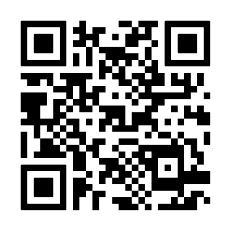
Learn more and listen to a FREE session.
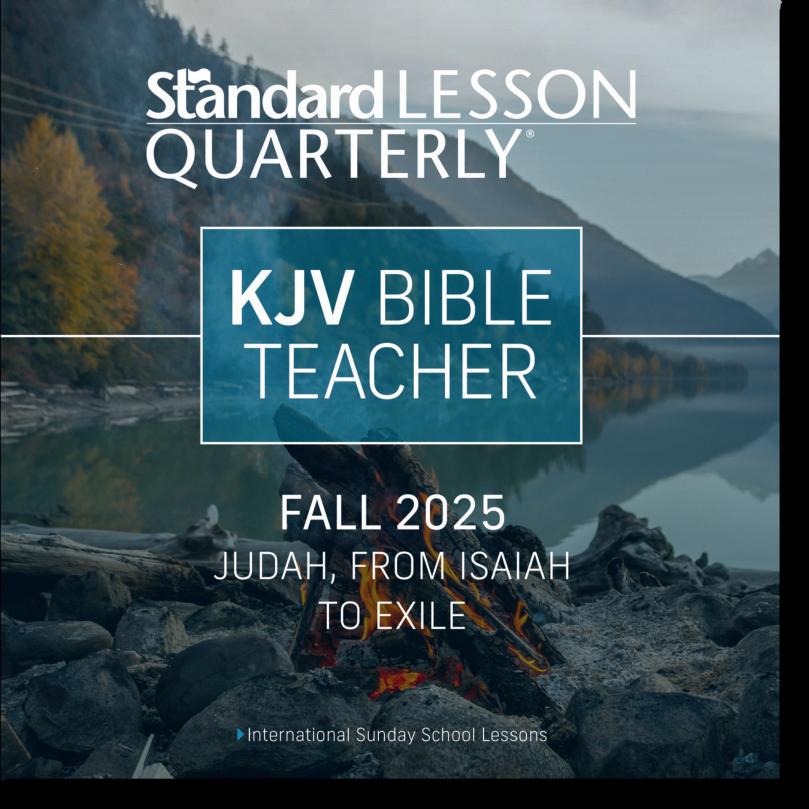
Take your Bible study with you–on your commute, to the gym, or anywhere. Introducing the Standard Lesson® Audio edition, so you can study when it’s most convenient for you.
NEW! Audio Edition
Judah, from Isaiah to Exile
Unit 1: Isaiah and the Renewal of the Temple
Unit 2:
Jeremiah and the Promise of Renewal
October 5 Jeremiah’s Call and Arrest
October 12 Jeremiah’s Message
October
Jeremiah 1:6–10; 26:8–9, 12–15 41
Unit 3: Ezekiel and the Exile of Judah November
November
Quarterly Quiz
Use these questions as a pretest or as a review. The answers are on page iv of This Quarter in the Word.
Lesson 1
1 . Isaiah’s throne-room vision occurred in the year that King Uzziah died . T/F . Isaiah 6:1
2 . How many additional years did the Lord promise Hezekiah? (1; 15; 20) Isaiah 38:5
Lesson 2
1 . It was decided that Hezekiah’s Passover would occur in the _________ month . 2 Chronicles 30:2
2 . Hezekiah’s Passover celebration resulted in “great ____ in Jerusalem .” 2 Chronicles 30:26
Lesson 3
1 . Who gave “the book of the law” to Shaphan? (Ahikam, Hilkiah, Asaiah) 2 Chronicles 34:15
2 . Which prophetess did Hilkiah speak with concerning the book of the law? (Huldah, Deborah, Noadiah) 2 Chronicles 34:22
Lesson 4
1 . The servant was “wounded for our .” Isaiah 53:5
2 . The Lord has laid on the servant the iniquity of us all . T/F . Isaiah 53:6
Lesson 5
1 . Jeremiah considered himself too old to speak . T/F . Jeremiah 1:6
2 . Jeremiah prophesied that “this house” (the temple) would become like what other location? (Sheol, Shechem, Shiloh) Jeremiah 26:9
Lesson 6
1 The Lord warned that lying words repeat this phrase: “The ______ of the Lord .” Jeremiah 7:4
2 . The Lord asked, “Is this house, . . . become a den of ________ in your eyes?” Jeremiah 7:11
Lesson 7
1 . Who commanded the Rechabites to never drink wine? (Joshua, Jonadab, Jehu) Jeremiah 35:6
2 . The Rechabites lived in tents, just as they were commanded T/F Jeremiah 35:10
Lesson 8
1 . In which did the Lord say He would “write” the law? (hearts, souls, minds) Jeremiah 31:33
2 . Which two “came by Jesus Christ”? (choose two: law, grace, covenant, truth) John 1:17
Lesson 9
1 . How many men did the king command Ebedmelech to take to rescue Jeremiah? (13; 30; 300) Jeremiah 38:10
2 . Immediately after his rescue, Jeremiah left “the court of the prison .” T/F . Jeremiah 38:13
Lesson 10
1 Nebuchadnezzar’s siege against Jerusalem began in the ______ year of Zedekiah’s reign . 2 Kings 25:1
2 . Who set fire to the temple, palace, and houses in Jerusalem? (Nebuchadnezzar, Zedekiah, Nebuzaradan) 2 Kings 25:8–9
Lesson 11
1 . The Lord called Ezekiel by what title? (Son of Judah, Son of man, Son of Jacob) Ezekiel 3:10
2 . Ezekiel would be a “signal” to the people of Judah . T/F . Ezekiel 24:27
Lesson 12
1 The Lord made Ezekiel a “________ unto the house of Israel .” Ezekiel 33:7
2 . The Lord God takes no pleasure in the death of the wicked . T/F . Ezekiel 33:11
Lesson 13
1 . The man went eastward and measured a total of 4,000 ________ . Ezekiel 47:3–5
2 . Ezekiel saw “very many _______” on both sides of the river . Ezekiel 47:7
Quarter at a Glance
This quarter invites us to discover and appreciate how God, through prophets and other leaders, gave help and guidance to the people of Judah As we study these people, we will see God’s hand at work in their lives, just as He is at work in our lives and all human affairs .
Isaiah and the Renewal of the Temple
The first unit presents us with the prophetic ministry of Isaiah . These lessons recount the theological reasons for the decline of Judah, seen mainly through Isaiah and two faithful kings of Judah . Lesson 1 introduces the call of that prophet and the substance of his witness to a king of Judah (Isaiah 6:1–8; 38:1–5; see lesson 1) .
While most kings of Israel and Judah earn bad grades from the writers of Kings and Chronicles, two seventh-century kings of Judah are revealed as seeking the Lord and reforming worship . King Hezekiah celebrates Passover according to what was written in the Law of Moses (2 Chronicles 30:1–9, 26–27; see lesson 2), while King Josiah is a “by-the-book strategist” who sought proper obedience to the Lord (34:15–22, 26–27; see lesson 3) .
The destruction of the temple, according to Scripture, was the result of social injustice, moral decay, and covenantal disobedience . Isaiah finds a spark of hope in the devastation—the prophetic suffering of the people has a redemptive purpose, testifying to God’s judgment and restoration . Near the end of the Babylonian exile, the prophet envisages a humiliated and afflicted servant who carries the sins of many (Isaiah 52:13–53:12; see lesson 4) .
Jeremiah and the Promise of Renewal
The second unit explores the prophetic career of Jeremiah, a prophet who lived during the worst of the Babylonian assault on Judah and Jerusalem . The Lord called Jeremiah to preach a harsh message to the people of Judah, one they wouldn’t heed (Jeremiah 26:8–9, 12–15; see lesson 5) .
by Editorial Staff
Through the prophet, the Lord warned the people: “Amend your ways and your doings” (Jeremiah 7:3; see lesson 6) The people had repeatedly forsaken the covenant; therefore, Jeremiah warns that judgment is coming . As Jerusalem teeters on the brink of extinction, Jeremiah is given a word of hope: after punishment, God will bring the people back home . On that day, the law of God will no longer be written in stone but in the human heart (31:33; see lesson 8) .
Ezekiel and the Exile of Judah
The final lessons recount Ezekiel’s prophetic messages to the people in exile . The account of 2 Kings 24:18–25:9, detailing the last days of Judah, is hard to read, as it is full of violence and desperation (lesson 10) Into that environment, the prophet-priest Ezekiel, in Babylon among the exiles, reports the devastation in Jerusalem (Ezekiel 24:20–21; see lesson 11) . His prophecies are replete with visions, signs, and symbolic actions, testifying to the utter ruin of the homeland and promises of renewal .
Ezekiel serves as a “watchman” to the people, keeping the promise of a return from exile alive.
When Ezekiel’s wife dies, he obediently follows God’s command not to mourn as a sign to the people that no one will weep when Jerusalem falls (Ezekiel 24:15–16) Ezekiel serves as a “watchman” to the people, keeping the promise of a return from exile alive (33:7–16a; see lesson 12) . Ezekiel’s message reaches its hopeful climax in his vision of a renewed temple with water flowing from it (Ezekiel 47:1–12; see lesson 13) . Ezekiel died in captivity, his life a living symbol that God’s Word is forever active, present, and powerful . His ministry helped transform the people into the remnant who find a renewed orientation for hope in the promises of God .
Get the Setting
The Role of a Prophet
Who were the prophets? Prophets are God’s mouthpieces delivering a divine perspective on history, politics, and the behavior of God’s people (Deuteronomy 18:18; Jeremiah 1:9; etc .) . While prophecies could contain unforeseen horizons, such as Jesus’ messianic first and second advents, they were nevertheless primarily concerned with the present crisis of their audience and the immanent consequences of responding to or neglecting God’s messages (Matthew 13:17; 1 Peter 1:10–12) . Prophets and prophecy were already present in cultures outside of Israel in the Iron Age throughout the ancient Near East and identified as “seers” and “prophets .” However, the unique embodiment of God’s oracles to Israel was represented by the prophets’ indictments, judgment, instruction, support, and explanations in the aftermath of events . Understanding their role in God’s purposes will provide a crucial background for many of the lessons this quarter .
Jeremiah’s Example
We turn now to consider one vignette in the ministry of the prophets of ancient Israel, following the fall of Samaria in 722 BC . Jeremiah was a prophet to the southern kingdom of Judah . His experiences convey a glimpse of God’s heart that wept over Jerusalem . Even as a young prophet, he pleaded with a rebellious generation to repent
The prophets were the poet-preachers of inconvenient truths . Grief poignantly marked the life of Jeremiah and won him the title “the weeping prophet .” Jeremiah’s anguish joined God’s lament against Judah’s repeated rejection of His words and ways (Jeremiah 13:17; 9:1, 10) . Jeremiah was sent to prophesy against kings in his own community: Josiah, Jehoiakim, and Zedekiah . After Jehoiakim’s deportation in 598 BC, instead of endorsing Zedekiah’s false hopes, Jeremiah
by Ryan D. Donell
dares to tell the king to submit to Babylon and the assured invasion (38:1–4) If Judah surrenders to Babylon, they will survive However, this requires them to renounce the propaganda that God’s people will never suffer defeat . Unable— or refusing—to believe that God would use a prophet to predict the siege of Jerusalem, Judah’s officials accuse Jeremiah of not seeking “the welfare of this people” (38:4) . Jeremiah is thrown into a deep cistern and left in the mire to die (38:6) . Even when he is finally lifted out, he does not soften God’s challenges to Zedekiah, no matter how harsh . Despite the hard words Jeremiah delivers, Zedekiah fails to yield . He refuses to heed the word of the Lord, and as a result Jerusalem is laid waste with a second wave of exiles being deported in 586 BC
Application for Today
God’s messages through the prophets prefigured the bodily disclosure of God’s Word, Jesus Christ (John 1:1–18; Hebrews 1:1–3) . While the majority of us will not be called upon to serve in the same kind of prophetic role as Jeremiah and other Old Testament prophets were, we do have a part to play in bringing God’s word to His people today . According to Old Testament scholar Walter Brueggemann, the church today must embody three prophetic tasks . First, we are to announce the reality of things, speaking forth the truth . Second, we are to grieve over sin both within God’s people and without Third, we must offer the hope of restoration . In recovering and living into this prophetic role, we may reclaim this promise given by Jesus in His Sermon on the Mount: “Blessed are ye, when men shall revile you, and persecute you, and shall say all manner of evil against you falsely, for my sake . Rejoice, and be exceeding glad: for great is your reward in heaven: for so persecuted they the prophets which were before you” (Matthew 5:11–12) .
This Quarter in the Word
Mon, Nov . 17 Love Others Despite Suffering 1 Peter 4:1–11 Tue, Nov 18 Rejoice to Share Christ’s Sufferings 1 Peter 4:12–19 Wed, Nov . 19 Answering for Sin Ezekiel 18:1–9 Thu, Nov . 20 I Confess My Iniquity Psalm 38:1–2, 10–22 Fri, Nov . 21 Restore One Another in Gentleness Galatians 6:1–10 Sat, Nov . 22 See to Your Own Sins First Matthew 7:1–6 Sun, Nov . 23 Let the Wicked Repent Ezekiel 33:7–16a Mon, Nov . 24 God Breathes New Life Ezekiel 37:1–7 Tue, Nov 25 A Resurrection of Hope Ezekiel 37:8–14 Wed, Nov . 26 The Thirsty Will Be Refreshed Isaiah 55:1–9 Thu, Nov . 27 Rivers of Living Water John 7:2–10, 37–39 Fri, Nov . 28 Hope for God’s New Creation Revelation 21:1–7 Sat, Nov . 29 The Tree of Life Revelation 22:1–5 Sun, Nov . 30 The River of Life Ezekiel 47:1–9, 12 Mon, Sep . 1 God Sends a Messenger Mark 1:1–8 Tue, Sep 2 God Defends the Chosen People Isaiah 7:1–7 Wed, Sep . 3 God Warns of Coming Disaster Isaiah 20:1–6 Thu, Sep . 4 God Fulfills Promises Matthew 11:1–6 Fri, Sep . 5 God Works through a Messenger Matthew 11:7–15 Sat, Sep . 6 God Is Gracious and Merciful Psalm 145:1–12 Sun, Sep . 7 God Strengthens the Called Isaiah 6:1–8; 38:1–5 Mon, Sep . 8 An Everlasting Kingdom Psalm 145:13–21 Tue, Sep 9 A Call to Bear Good Fruit Matthew 3:4–12 Wed, Sep . 10 A Summons to Repent Acts 3:12–20 Thu, Sep . 11 A Ministry of Care and Comfort James 5:12–18 Fri, Sep . 12 A Feast of Remembrance Exodus 12:3–14 Sat, Sep . 13 A Dwelling for God’s Name Deuteronomy 12:5–12 Sun, Sep . 14 An Act of Repentance and Renewal 2 Chronicles 30:1–9, 26–27 Mon, Sep . 15 The Command to Love Matthew 22:36–40 Tue, Sep 16 Righteous in God’s Sight Romans 2:9–16 Wed, Sep . 17 Promised Restoration Deuteronomy 30:1–10 Thu, Sep . 18 Choose Life Deuteronomy 30:11–21 Fri, Sep . 19 A Greater Message Hebrews 1:13–2:4 Sat, Sep . 20 Hidden Treasure Matthew 13:44–52 Sun, Sep . 21 Sorrow Leads to Joy 2 Chronicles 34:15–22, 26–27
Mon, Sep . 22 The Humble Servant Philippians 2:5–10 Tue, Sep 23 The Faithful Servant Isaiah 42:1–7 Wed, Sep . 24 The Resurrected Servant Acts 2:25–31 Thu, Sep . 25 A Light for the World Acts 13:44–49 Fri, Sep . 26 A Doorkeeper in God’s House Psalm 84 Sat, Sep . 27 God’s Servant Obeys Isaiah 50:4–9 Sun, Sep . 28 The Suffering Servant Isaiah 53:1–7 Mon, Sep . 29 Passion for God’s Laws 2 Chronicles 34:1–7 Tue, Sep 30 The Piercing Word of God Hebrews 4:12–16 Wed, Oct . 1 Return to the Father Jeremiah 3:12–19 Thu, Oct . 2 Cleanse Yourselves and Be Saved Jeremiah 4:5–14 Fri, Oct . 3 God’s Discipline Proves God’s Love Hebrews 12:3–17 Sat, Oct . 4 God Is a Consuming Fire Hebrews 12:18–29 Sun, Oct . 5 A Defiant Prophet Jeremiah 1:6–10; 26:8–9, 12–15 Mon, Oct . 6 Endure to the End Mark 13:1–13 Tue, Oct 7 God Will Protect God’s People Mark 13:14–27 Wed, Oct . 8 To Obey Is Better than Sacrifice 1 Samuel 15:20–26 Thu, Oct . 9 Keep Christ’s Commandments John 14:12–17 Fri, Oct . 10 An Indestructible Temple John 2:12–22 Sat, Oct . 11 The Sacrifice That Pleases God Psalm 51:15–19 Sun, Oct . 12 Amend Your Ways! Jeremiah 7:1–11, 21–23 Mon, Oct . 13 The Dangers of Strong Drink Proverbs 23:29–35 Tue, Oct 14 Keep Earthly Pleasures in Perspective Ecclesiastes 9:4–10 Wed, Oct . 15 Be Filled with the Spirit Ephesians 5:11–19
Thu, Oct . 16 The Nazirite Vow Numbers 6:1–8 Fri, Oct . 17 Called to Holiness 1 Thessalonians 4:1–7 Sat, Oct . 18 Keep Awake! 1 Thessalonians 5:1–10 Sun, Oct . 19 A Vow of Holiness Jeremiah 35:5–11 Mon, Oct 20 A New Salvation Joel 2:28–32 Tue, Oct . 21 A New Heart Ezekiel 36:25–35 Wed, Oct 22 The Law’s Essence Deuteronomy 10:12–21 Thu, Oct . 23 A New Covenant 2 Corinthians 3:1–6 Fri, Oct 24 A New Spirit 2 Corinthians 3:7–11 Sat, Oct . 25 A New Freedom 2 Corinthians 3:12–17 Sun, Oct 26 A New Relationship with God Jeremiah 31:27–34 Mon, Oct 27 Speak as the Spirit Leads Matthew 10:16–27 Tue, Oct . 28 Do Not Fear Mortal Powers Matthew 10:28–42 Wed, Oct 29 Wait Patiently for the Lord Psalm 37:1–13 Thu, Oct . 30 God Never Forsakes the Righteous Psalm 37:25–28, 35–40 Fri, Oct 31 Overcome Evil with Good Romans 12:12–21 Sat, Nov . 1 Speak Even When the Message Stings Jeremiah 38:1–6 Sun, Nov . 2 An Advocate Pleads for Justice Jeremiah 38:7–13 Mon, Nov . 3 The Master Is Coming Soon Luke 12:42–48 Tue, Nov . 4 The Purifying Fire of Change Luke 12:49–53 Wed, Nov . 5 The Lord’s Purifying Purpose Lamentations 2:17–22 Thu, Nov . 6 Hope in the Lord Lamentations 3:21–36 Fri, Nov . 7 Faith Tested by Fire 1 Peter 1:1–12 Sat, Nov . 8 Prepare for Action 1 Peter 1:13–25 Sun, Nov . 9 God’s Judgment Is Sure 2 Kings 24:18–25:9 Mon, Nov . 10 With Righteousness Comes Suffering 1 Peter 3:8–17 Tue, Nov . 11 Christ Exalted through Suffering 1 Peter 3:18–22 Wed, Nov . 12 God Rescues Us from Our Afflictions Psalm 34:6–19 Thu, Nov . 13 Comfort for the Brokenhearted Matthew 5:3–12 Fri, Nov . 14 Speak if People Listen or Not Ezekiel 3:4–11 Sat, Nov . 15 Steadfastness amid Persecution 2 Thessalonians 1:1–4 Sun, Nov . 16 Unspeakable Grief Ezekiel 24:15–27

Prep with Internet Resources
Teacher Tips by Tanae Murdic
Many teachers desire additional resources to guide them in their study and preparation for teaching adults . You can move beyond physical resource limitations if you have access to the internet Use of various websites can expand your access to resources exponentially, bringing numerous options to your fingertips with just a few clicks . Please note that the listing of websites in this article is neither exhaustive nor is it necessarily an endorsement of everything to be found on these sites . Standard Lesson serves a broad audience, and some sites may have been created by those who hold different doctrinal convictions from ours or your own . As in all things, use discernment .
Resources for Nearly Any Lesson
No concordance handy? No worries! Just visit www biblegateway com You can search for keywords and topics on this site It also contains a wide range of Bible translations that can be displayed in parallel columns for side-byside comparison . Another Bible site is www . blueletterbible .org, which offers several Bible translations alongside commentaries and other study tools .
For matters of history and setting, you may want to visit www .bible-history .com . The Bible History home page displays a long list of categories on the left side of the screen, which may aid your preparation . This site also includes several church history resources . Another helpful resource is the “Resource Pages for Biblical Studies” found at www torreys org/bible Here you can find pages that examine texts and translations, electronic publications, and materials relating to the social aspects of the Mediterranean world .
Like Bible Gateway, the Bible Study Tools site (www .biblestudytools .com) is a great resource with many aids . It houses several Bible translations
as well as Bible commentaries, encyclopedias, dictionaries, a parallel Bible, and an interlinear Bible In the search window, you can search within specified categories, such as Bible, topic, Bible study, references, Bible stories, and even pastors . The “References” tab holds a wealth of resources, including the works of Josephus . Josephus’s works are a wonderful resource for a typically reliable, though not inspired, history of the Jews from the first century . For archaeological evidence and background for Bible lessons, visit www .biblehistory .net . This site has several tabs (“volumes”) that contain links to various articles that may prove useful in lesson preparation Clicking on a link will open a page that you can save to your computer as a PDF file, which you can use as a handout or simply read in preparation for the lesson . For example, the information found at www .biblehistory . net/joshua .html provides some interesting details about a letter that archaeologists discovered, which was sent from Jerusalem to Egypt asking for help against the “Habiru” (possibly referring to the “Hebrews”) . Regarding Old Testament studies, some Jewish resources can be helpful . One such site is www .jewishencyclopedia .com, which provides the entire text of the 1906 print edition of the Jewish Encyclopedia online Topics can be found instantly by typing a word in the search window .
Finding Information on General Sites
General search engines can also provide help . But use these with care . As with any media consumption, consider the reputability of your source . Since just about anyone can post anything to the internet, the presence of information there does not necessarily mean it is accurate . Use discretion when deciding which sources to use and cite in your study preparation .
Isaiah’s Call and Ministry
Devotional Reading: Isaiah 2:1–5
Background Scripture: Isaiah 6:1–13; 7:1–7; 20:1–6; 38:1–22
Isaiah 6:1–8
1 In the year that king Uzziah died I saw also the Lord sitting upon a throne, high and lifted up, and his train filled the temple.
2 Above it stood the seraphims: each one had six wings; with twain he covered his face, and with twain he covered his feet, and with twain he did fly.
3 And one cried unto another, and said, Holy, holy, holy, is the L ord of hosts: The whole earth is full of his glory.
4 And the posts of the door moved at the voice of him that cried, and the house was filled with smoke.
5 Then said I, Woe is me! for I am undone; because I am a man of unclean lips, and I dwell in the midst of a people of unclean lips: for mine eyes have seen the King, the Lord of hosts.
6 Then flew one of the seraphims unto me, having a live coal in his hand, which he had taken with the tongs from off the altar:
7 And he laid it upon my mouth, and said, Lo, this hath touched thy lips; and thine iniquity is taken away, and thy sin purged.
8 Also I heard the voice of the Lord, saying, Whom shall I send, and who will go for us? Then said I, Here am I; send me.
Key Text
Isaiah 38:1–5
1 In those days was Hezekiah sick unto death. And Isaiah the prophet the son of Amoz came unto him, and said unto him, Thus saith the L ord, Set thine house in order: for thou shalt die, and not live.
2 Then Hezekiah turned his face toward the wall, and prayed unto the L ord,
3 And said, Remember now, O L ord, I beseech thee, how I have walked before thee in truth and with a perfect heart, and have done that which is good in thy sight. And Hezekiah wept sore.
4 Then came the word of the L ord to Isaiah, saying,
5 Go, and say to Hezekiah, Thus saith the L ord, the God of David thy father, I have heard thy prayer, I have seen thy tears: behold, I will add unto thy days fifteen years.
Also I heard the voice of the Lord, saying, Whom shall I send, and who will go for us? Then said I, Here am I; send me. —Isaiah 6:8
Judah, from Isaiah to the Exile
Lesson Aims
After participating in this lesson, each learner will be able to:
1 . Summarize what Isaiah saw and his reaction to it
.
2 . Compare and contrast Isaiah’s reaction to God’s call with that of Jeremiah in reaction to his own call (lesson 5) .
3 . Express how to distinguish an authentic call of God from a mere felt need .
Lesson Outline
Introduction
A . It’s Your Call (and His)
B . Lesson Context
I. Commissioned by God (Isaiah 6:1–8)
A . What Isaiah Saw (vv . 1–2)
B What Isaiah Heard (v 3)
C What Isaiah Sensed (v 4)
D . What Isaiah Said (v . 5) Majesty Approached
E . What Isaiah Received (vv . 6–8) Discerning God’s Call
II. Communication with a King (Isaiah 38:1–5)
A . Message of Death (v . 1)
B . Tears of Bitterness (vv . 2–3)
C . Extension of Life (vv . 4–5)
Conclusion
A . Here Am I . Send Me!
B . Prayer
C . Thought to Remember
Introduction
A. It’s Your Call (and His)
At age 11, I first sensed God calling me to vocational ministry . During a revival meeting, an evangelist approached me and said, “Young man, I’m setting you aside for the ministry .” At that time, the encounter did not impact me, but I reconsidered the evangelist’s words years later . Throughout my teenage years, I continued to sense that call to ministry Trusted friends repeatedly encouraged me People in my congregation confirmed the call and encouraged me to begin training for ministry . Backed by the encouragement and confirmation from my congregation, I enrolled in a Bible college to follow the Lord’s call . There seem to be two types of calls from God . The first type is what we might designate as a “general” call . These are the thoughts, actions, and attitudes that God expects of every believer . The expectations of this call are found in the pages of Scripture . The second type is what we might designate as a “specific” call: a sensed call of God to a particular or specialized ministry There is disagreement regarding whether every believer receives this kind of call . Today’s lesson examines the details of a call unmistakably from God .
B. Lesson Context
Isaiah began his prophetic ministry about 200 years after the nation of Israel divided . In 931 BC, the united monarchy of Israel split into two parts: Israel (the northern kingdom) and Judah (the southern kingdom) . Isaiah’s ministry focused on the southern kingdom of Judah, as reflected by the Judean kings listed in Isaiah 1:1 .
Surprisingly, the Lord’s call on Isaiah doesn’t occur until Isaiah 6 . This is at variance from the usual pattern of recording a prophet’s call at or very near a book’s beginning (examples: Jeremiah 1:4–19; Ezekiel 1:1–3:15) . Perhaps the writer wanted to establish the context of the call, which the first five chapters of Isaiah accomplish .
The people of Judah had become a “sinful nation,” being openly rebellious against the Lord (Isaiah 1:1–5) . A sense of self-sufficiency accom-
panied a facade of economic prosperity, military security, and religious arrogance (2:7–8) . The Lord depicts His people as a vineyard that produced unacceptable fruit (5:1–7) . In their doing of injustice, they had redefined the terms good and evil (5:20) .
Such was the era that Isaiah found himself in when his call came about
I. Commissioned by God
(Isaiah 6:1–8)
A. What Isaiah Saw (vv. 1–2)
1a. In the year that king Uzziah died.
Uzziah (also known as “Azariah” in 2 Kings 15:1–7) reigned as king of Judah for 52 years (2 Chronicles 26:3) . We don’t know the exact years of his reign, but one estimate gives the range of 792–740 BC .
For much of his reign, Uzziah did “right in the sight of the Lord” and, as a result, God allowed him to experience blessing (2 Chronicles 26:4–5) . However, pride led to his downfall when he entered the temple to burn incense (26:16–21) .
1b. I saw also the Lord sitting upon a throne, high and lifted up, and his train filled the temple.
At least two possibilities exist regarding the setting of the temple . One possibility is that the setting is the earthly temple of Solomon in Jerusalem . Another option is that Isaiah sees the heavenly temple . Given the actions of Uzziah in the Jerusalem temple (see above), some commentators suggest this setting allows Isaiah to realize that the presence of the Lord has not departed from the temple (contrast Ezekiel 11:22–23) Still, others suggest that the vision’s grandeur indicates the heavenly temple (compare Revelation 11:19) . Regardless, the significance is that Isaiah sees the location where the enthroned Lord rules .
That Isaiah saw . . . the Lord is echoed in John 12:41 . This fact does not contradict Exodus 33:20 or John 1:18 . What Isaiah sees is called a theophany, which is a manifestation of God, not God in His actual essence (compare Genesis 28:13–15; Exodus 24:9–11; 1 Kings 22:19) .
The Lord’s position sitting upon a throne reveals
Him as the living heavenly King . Although the earthly King Uzziah has died, the Lord still reigns! The throne’s elevated location, high and lifted up, reflects the exalted nature of His being (compare Isaiah 57:15; Revelation 4:2) .
The expansive nature of the train of His garment is echoed in Revelation 1:13 Special garments marked the identity of significant figures, like priests or kings (compare Exodus 28:33–34; 39:24–26, where the word is translated “hem”) . However, the garment Isaiah sees is unlike any garment worn by a human . The size of this garment filled the temple, leaving Isaiah incapable of giving further description .
2. Above it stood the seraphims: each one had six wings; with twain he covered his face, and with twain he covered his feet, and with twain he did fly.
The word seraphims is a transliteration (not a translation) of a Hebrew word . That’s where a word in one language is brought over into another language simply by swapping the letters of the word in the original language into the letters that sound the same in the receptor language .
The transliteration of this word occurs only here and in Isaiah 6:6, below . This Hebrew word elsewhere refers to serpents (Numbers 21:6, 8; Deuteronomy 8:15; Isaiah 14:29; 30:6) . The root of this word may come from a Hebrew word meaning “fiery” or “burning .” One possibility is that the seraphims appear as flaming, winged creatures .
What Do You Think?
What does the covering of the seraphims reveal to us about postures of worship and prayer?
Digging Deeper
How do physical, mental, and emotional postures affect your acts of worship?
B. What Isaiah Heard (v. 3)
3a. And one cried unto another, and said, Holy, holy, holy, is the L ord of hosts.
The proclamation of the seraphims Holy, holy, holy, is the Lord of hosts is similar to that of the four “beasts” in Revelation 4:8 . The repetition of the
word holy stresses its significance: the Lord’s holiness is unparalleled!
The Hebrew adjective translated “holy” appears in 34 verses in Isaiah; clearly, it’s a vital concept to the writer, implying “separation” or “distinctiveness .” The Lord’s holiness means that He is separate from His creation in that He is morally perfect (Deuteronomy 32:4; 1 Samuel 2:2; Psalm 18:30; Habakkuk 1:12–13; etc .) .
The designation Lord of hosts or “Lord God of hosts” appears 274 times in the Old Testament, with about 75 percent of those occurring in the prophetic books of Isaiah, Jeremiah, Haggai, Zechariah, and Malachi . As the timeline of history advances, God’s power is increasingly stressed since the title reflects the Lord’s power as king and commander of the heavenly armies (see 1 Samuel 4:4; Psalm 24:10; Isaiah 1:24; etc .) .
3b. The whole earth is full of his glory.
No human-made structure can confine the glory of God (1 Kings 8:27) Since the whole earth belongs to God as its creator, it cannot but help to reflect His glory (Numbers 14:21; Psalm 72:19) .
What Do You Think?
How do you describe the relationship between God’s holiness and the holiness of His people (1 Peter 1:15–16)?
Digging Deeper
How can you help others worship God for His holiness?
C. What Isaiah Sensed (v. 4)
4. And the posts of the door moved at the voice of him that cried, and the house was filled with smoke.
The seraph’s voice has an impressive impact, causing the posts of the door to move . Although the text does not indicate the location of this door, it is likely at the entrance of the envisioned temple (see Isaiah 6:1b, above) .
The presence of smoke in Scripture is sometimes associated with the presence of God (example: Exodus 19:18) . That presence can be in a negative sense of divine judgment (example: Isaiah 9:18–19) . Or it can be in a positive sense of divine guidance or care
September 7
(example: Isaiah 4:5) . Smoke also serves to conceal the viewer from seeing aspects of the divine directly, thus preventing death (Leviticus 16:13) . The smoke in the context of the verse at hand brings to mind the cloud that “filled the house of the Lord” in Solomon’s time (1 Kings 8:10) .
D. What Isaiah Said (v. 5)
5. Then said I, Woe is me! for I am undone; because I am a man of unclean lips, and I dwell in the midst of a people of unclean lips: for mine eyes have seen the King, the L ord of hosts.
Isaiah pronounces woe more than 20 times in his book . All but two of those are voiced against those who conduct themselves in ways that oppose God . In the remaining two uses, the prophet pronounces “woe” against himself (here and in Isaiah 24:16) .
The expression Woe is me! reveals Isaiah’s feeling of unworthiness to experience the sights and sounds before him He knows his unholiness prevents him from being in the presence of a holy God, the Lord of hosts, even in a vision . The prophet confesses that his sin makes him unclean . He also admits to living among a people of unclean lips, but this admission is not to shift the blame to excuse his own sinful condition . In acknowledging his own unholiness, he is taking personal responsibility for it .
What Do You Think?
In what ways can our corporate worship include times of confession?
Digging Deeper
What biblical examples of corporate confession can you name?
Majesty Approached
My first visit to Colorado was not what I expected . I was attending a conference near the base of Pikes Peak, one of the tallest mountains in the state . I looked forward to a few days of crisp air, blazing sunshine, and exhilarating mountain views . When my friend and I arrived, a dense fog hung over the landscape like a blanket . We arrived at our hotel and parked our rental car without
Call and Ministry
catching a glimpse of Pikes Peak . But the following morning, the sky was clear, and the sun was dazzling . As we drove toward the conference center, Pikes Peak dominated our view . Of course, the mountain had been there the night before, but the fog had concealed it . What the fog had concealed was now revealed!
The sight of a towering mountain has a way of humbling me, reminding me of the majesty of its Creator . Isaiah felt unworthy to view the majesty of the holy and enthroned Lord . How do you combine that same realization with Hebrews 4:16 in approaching His throne in prayer? —N . H .
E.
What Isaiah Received (vv. 6–8)
6. Then flew one of the seraphims unto me, having a live coal in his hand, which he had taken with the tongs from off the altar.
In response to Isaiah’s admission in the previous verse, one of the seraphims goes into action on the man’s behalf The altar from which the seraph takes a live coal refers possibly to the altar in the temple Solomon built (1 Kings 9:25) . But an altar in a temple of the heavenly environs cannot be ruled out because an altar is present there as well (Revelation 6:9; 14:18; 16:7) . Isaiah undoubtedly watches with great apprehension as the scene unfolds . Having just confessed his own sinful unworthiness, is he about to be punished?
7. And he laid it upon my mouth, and said, Lo, this hath touched thy lips; and thine iniquity is taken away, and thy sin purged.
We can only imagine the emotions that surge through Isaiah as he witnesses the seraph approaching with a burning coal Three of Isaiah’s five senses have informed his experience thus far . By sight he has beheld the Lord (Isaiah 6:1); by hearing he has perceived the declaration of the seraphims (6:3); by sight and (assumed) smell he is aware of smoke (6:4) . Now the fourth sense, touch, comes into play . We do not know if Isaiah feels any sting or pain from the red-hot coal that touches his lips . If so, it must be temporary, as the words thine iniquity is taken away, and thy sin purged speak not of judgment but of forgiveness .
At least four Hebrew words can be translated “(burning) coal,” so we should be rigorous in
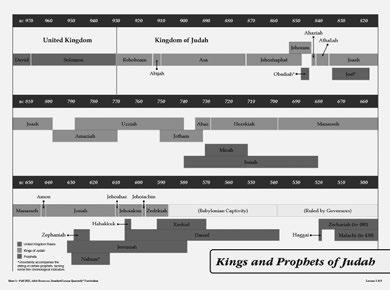
Visual for Lessons 1 & 9. Display this visual as you discuss the prophets and kings of this quarter’s lessons.
allowing context to determine meaning and significance . The act of touching this coal to Isaiah’s mouth symbolizes his purification from sin . We also notice that although Isaiah’s unholiness is corrected through the cleansing action taken by one of the seraphims, the prophet’s own confession of unholiness comes first
8a. Also I heard the voice of the Lord, saying, Whom shall I send, and who will go for us?
First, the seraphims spoke (Isaiah 6:3, above) . Then Isaiah spoke (6:5) . Then one seraph spoke (6:7) . Now, the Lord Himself speaks by asking two questions . The first question deals with “sender action,” and the second deals with “servant action .” These are important questions because the Lord expects those who trust in Him to be His hands and feet at times (Romans 10:15) . Sadly, that does not always happen (example: Ezekiel 22:30) .
The first-person plural pronoun us is similar to the language used in account of creation and in response to the building of the Tower of Babel (Genesis 1:26; 11:7) The plural pronoun may refer to the Lord and the seraphim who make up His heavenly counsel (compare 1 Kings 22:19) . Other commentators suggest that the plural pronoun may refer to the three persons of the Trinity: God the Father, God the Son, and God the Holy Spirit . Isaiah, however, is probably not mulling over such matters at this point; all he hears is the call for someone to go on the Lord’s behalf . And he wastes no time in responding .
Discerning God’s Call
Charles Spurgeon, the famous nineteenthcentury preacher, had no formal theological education . Yet he preached to thousands every Sunday for more than 40 years!
How did God call him to such a task? Once, when describing his call to ministry, Spurgeon said it was “an intense, all-absorbing desire for the work .” Those who like neat logical categories may be unsatisfied with that description . They may desire to have the idea of God’s calls examined in specific terms of form, content, etc .
Perhaps we may discern a more practical approach in the New Testament, where God’s calls seem to come about as character and spiritual giftedness are observed . The first-century church chose “seven men of honest report, full of the Holy Ghost and wisdom” to serve in a specific capacity (Acts 6:3–5) . Can we not conclude that they answered God’s call to do so? Barnabas seems initially to have simply grown into his leadership role, having been recognized by others as a “son of consolation” who led by example and spoke up on behalf of others (4:36–37; 9:27) . These traits were evident before he was set apart for missionary travels by a specific directive of the Holy Spirit (13:2) .
Martin Luther was on target when he described his call as “God’s voice heard by faith .” When our aptitudes, spiritual gifts, circumstances, and opportunities come together, let us make sure we are not overlooking God’s call . —C . R . B .
8b. Then said I, Here am I; send me.
Isaiah’s once unclean lips are ready to serve on the Lord’s behalf He is willing to go wherever the Lord would send him His willingness to be sent contrasts with the hesitancy of prophets such as Moses (Exodus 3:11) and Jeremiah (Jeremiah 1:6) .
How to Say It
Amoz Ay- mahz. Habakkuk Huh- back- kuk.
Hezekiah Hez-ih- kye- uh. theophany the- ah -fuh-nee. seraphims sair- uh-fimz.
Uzziah Uh-zye- uh.
What Do You Think?
What prevents believers from saying, “Here am I. Send me!” to God?
Digging Deeper
What steps can believers take to remove these barriers?
II. Communication with a King
(Isaiah 38:1–5)
The events of Isaiah 38:1–5 occur sometime before the deliverance of Jerusalem from Assyrian invasion, described in Isaiah 36–37 . This is based on Isaiah 38:6, which describes the rescue as a future promise . By this time, Isaiah’s lengthy prophetic ministry was several decades old . The parallel accounts to Isaiah 38:1–6 are found in 2 Kings 20:1–6 and 2 Chronicles 32:24–26 .
A. Message of Death (v. 1)
1a. In those days was Hezekiah sick unto death.
Hezekiah reigned as king of Judah from 715 to 686 BC . The king’s diagnosis is untold . Part of his suffering includes a skin ailment, causing Isaiah to direct him to use “a lump of figs” as “a plaister upon the boil” (Isaiah 38:21) .
1b. And Isaiah the prophet the son of Amoz came unto him, and said unto him, Thus saith the L ord, Set thine house in order: for thou shalt die, and not live.
We do not know whether the ailing king sent for Isaiah the prophet or whether the Lord directed Isaiah to appear before the king Either way, Isaiah’s earlier proclamation, “Here I am; send me” (Isaiah 6:8b, above), is consistent with his role as God’s messenger .
The descriptor of the prophet being the son of Amoz appears thirteen times in the Old Testament, seven of which appear in the book of Isaiah (here and in Isaiah 1:1; 2:1; 13:1; 20:2; 37:2, 21) . Scripture gives no other details regarding Isaiah’s father .
The message Isaiah brings is not of his own but from the Lord . Two phrases repeat the same mortal warning: Hezekiah shalt die and not live . Isaiah
September 7
■ 14 ■ Isaiah’s Call and Ministry
gives no promise of healing . Instead, he directs the king to set his affairs in order .
What Do You Think?
How would you support someone who has received news of a terminal diagnosis?
Digging Deeper
In such a case, how do you discern whether or not to show your support by speaking up or remaining silent?
B. Tears of Bitterness (vv. 2–3)
2. Then Hezekiah turned his face toward the wall, and prayed unto the L ord.
The prophet’s somber message devastates Hezekiah . Perhaps the king is lying on his bed when he receives Isaiah’s word . Turning his face toward the wall may be an attempt to hide his reaction from others present or to focus on his prayer—or both
3. And said, Remember now, O L ord, I beseech thee, how I have walked before thee in truth and with a perfect heart, and have done that which is good in thy sight. And Hezekiah wept sore.
Hezekiah has reason to claim that he had done that which is good . As king of Judah, he has renovated the temple, overseen its purification, and restored worship practices there (2 Chronicles 29) . He has removed artifacts of pagan worship throughout Judah (2 Kings 18:4) . The phrase wept sore is a two-word summary of the anguish he expresses in Isaiah 38:9–14 .
C. Extension of Life (vv. 4–5)
4. Then came the word of the L ord to Isaiah, saying.
The parallel account in 2 Kings 20:4 adds more detail . It describes how Isaiah departs after giving the message but has not gone far when the Lord directs him to give another word to the king .
5a. Go, and say to Hezekiah, Thus saith the L ord, the God of David thy father.
The declaration thus saith the Lord indicates that the prophet’s message is not his own . Instead, Isaiah brings it from the Lord (compare Exodus
4:22; 2 Samuel 7:5; Jeremiah 2:2) . The appeal to David thy father highlights Hezekiah’s position as David’s descendant (1 Chronicles 3:10–13) .
5b. I have heard thy prayer, I have seen thy tears: behold, I will add unto thy days fifteen years.
This message announces a reversal The biblical record reveals that, at first, Hezekiah became prideful (2 Chronicles 32:24–25) . But subsequent repentance paved the way for notable accomplishments (32:26–33) .
Conclusion
A. Here Am I. Send Me!
Not everyone will experience the same call to vocational ministry as I described at the outset . However, God calls everyone to serve Him . Regardless of where God calls us to serve, we should answer with our version of “Here am I; send me!”
When we respond humbly and willingly, God will use us to represent Him to others . Some of us may serve God through vocational ministry . Others will serve Him via their witness through their “9-to-5” jobs, relationships with family and friends, financial support of mission work, etc . When we follow God’s call, regardless of where it takes us, we are in a place of service to Him .
B. Prayer
Heavenly Father, help us be attentive to how You have called us to go into the world and represent You . Give us the courage to speak of You to a world that desperately needs to know You and Your message of salvation In Jesus’ name, we pray, Amen .
C. Thought to Remember Respond
to God’s call!
Visuals FOR THESE LESSONS
The visual pictured in each lesson (example: page 13) is a small reproduction of a large, full- color poster included in the Adult Resources packet for the Fall Quarter. Order No. 9780784739136 from your supplier.
Involvement Learning
Enhance your lesson with KJV Bible Student (from your curriculum supplier) and the reproducible activity page (at www.standardlesson.com or in the back of the KJV Standard Lesson Commentary Deluxe Edition).
Into the Lesson
Begin class time by offering the following imaginary scenarios:
1 You are lost in a dark cave without a companion, weapon, or light . You hear a rumbling noise deep in the cave The sound grows louder and seems to approach you . What would you do next?
2 You open your mailbox and discover an envelope containing a cashier’s check written for $10,000 . The check is made out to you, but there is no personal information regarding the source of the check . What would you do next?
Alternative . Ask participants to describe when they experienced an extraordinary or surprising occurrence . How did they respond?
After either activity, lead into the Bible study by saying, “When we experience something extraordinary, our response may have a lasting and powerful effect . In today’s study, consider how Isaiah responded to the extraordinary call of God . ”
Into the Word
Ask a volunteer to read aloud Isaiah 6:1–8 . Divide participants into four groups: Sight Group, Smell Group, Sound Group, and Touch Group . Distribute a sheet of paper and a pen to each group . Ask them to write down words or phrases from the text related to their assigned sense . Then, encourage groups to use their “sanctified imagination” to add further details to the narrative regarding their assigned sense
Alternative . Distribute copies of the “Four Senses” exercise from the activity page, which you can download . Have learners work with a partner to complete as indicated .
Option 1 . Distribute copies of the “Problem and Solution” activity from the activity page . Have participants complete it in groups of three before discussing conclusions in whole-class discussion .
Option 2 . Divide the class into two groups: Isaiah Group and Jeremiah Group. Have each group read Isaiah 6:1–8 and Jeremiah 1:4–19 . Dis-
7
tribute handouts (you create) to each group with questions for in-group discussion .
Isaiah Group. 1–Describe how Isaiah reacted to God’s call . 2–How did God respond to Isaiah? 3–Compare Isaiah’s call with the call of Jeremiah . Jeremiah Group . 1–Describe how Jeremiah reacted to God’s call . 2–How did God respond to Jeremiah? 3–Compare Jeremiah’s call with the call of Isaiah
After five minutes of discussion, reconvene the groups to share their findings .
Divide the class into small groups . Have groups study Isaiah 38:1–5 and decide whether each statement below is true or false . Distribute a handout (you create) with the statements:
1 . Isaiah spoke a word to King Manasseh .
2 . The king rejected Isaiah’s word and refused to turn to God in prayer .
3 . The king requested that the Lord remember the good works of the king’s ancestors .
4 Isaiah wept when he saw the response of the king
5 . The Lord promised to add five years to the life of the king
If the statement is false, they should rewrite it to make it true . (Note: every statement is false .) Give groups several minutes, then review as a whole class .
Into Life
Lead into the activity by saying, “Think of a time when you believed you had received a message or call from God . How did you know it was from God? How did you respond?” Ask participants to share responses with a partner . After three minutes, ask pairs to brainstorm ways to discern an authentic call of God from a mere felt need Ask volunteers to share responses and write them on the board
Distribute index cards and pens to participants . Read aloud Isaiah 6:8 as participants write down the phrase “Here am I; send me .” Challenge participants to post the cards in a visible place as a daily reminder to pray for obedience to God’s call .
Isaiah’s Call and Ministry
Four Senses
Lesson 1, Isaiah 6:1–8; 38:1–5, KJV
Work with a partner to read Isaiah 6:1–8 and write down words or phrases in the text related to each header.
Sense of Sight Sense of Smell Sense of Sound Sense of Touch/ Feeling
Using your “sanctified imagination,” list possible details about the vision regarding each sense.
Problem and Solution
Read Isaiah 6:5–8 and complete the charts below. Use the questions to guide you and write down one to three words for each answer.
Problem #1 (v. 5)
WHO expresses the problem? ____________
WHAT is the problem? _________________
WHY is it a problem? __________________
Problem #2 (v. 8a)
WHO expresses the problem? ____________
WHAT is the problem? _________________
WHY is it a problem? ___________________
Solution #1 (vv. 6–7)
WHO presents the solution? _____________
WHAT is the solution? _________________
WHY is it the solution? _________________
Solution #2 (v. 8b)
WHO presents the solution? _____________
WHAT is the solution? _________________
WHY is it the solution? _________________
Standard Lesson Resources®. Permission is granted to reproduce this page for ministry purposes only—not for resale.
KJV BIBLE STUDENT

FALL 2025 JUDAH, FROM ISAIAH TO EXILE
International Sunday School Lessons
Judah, from Isaiah to Exile
Contributors
Lesson Development ........................... Doug Redford (1, 4, 7), John Mark Hicks (2–3), Mark Krause (5–6, 8–9), Jon Weatherly (10), Mark Hamilton (11–13) Involvement Learning Connie Chandler (1, 4, 7), Jon Miller (2–3, 5), Angela Reed (6, 8–9), Mark A. Taylor (10–13)
Editorial Team Jessica J. Schroeder, Taylor Z. Stamps
KJV Bible Student is published quarterly by Standard Publishing®, an imprint of David C Cook, DavidCCook.org. © 2025 by David C Cook, 4050 Lee Vance Drive, Colorado Springs, CO 80918, U.S.A. Standard Lesson Quarterly® Curriculum and David C Cook and its related logo are registered trademarks of David C Cook. All rights reserved. Regular Print Edition ISBN 978-0-784-77876-0. Large Print Edition ISBN 978-0-784-77877-7. Printed in the United States of America. Scripture taken from the King James Version. Lessons and/or Readings are based on the Uniform Series International Sunday School Lessons International Bible Lessons for Christian Teaching Copyright © 2022 National Council of the Churches of Christ in the USA. Used by permission. All rights reserved.
Isaiah’s Call and Ministry
Devotional Reading: Isaiah 2:1–5
Background Scripture: Isaiah 6:1–13; 7:1–7; 20:1–6; 38:1–22
Today’s Scripture: Isaiah 6:1–8; 38:1–5
I. Commissioned by God
Isaiah 6:1–8
1 In the year that king Uzziah died I saw also the Lord sitting upon a throne, high and lifted up, and his train filled the temple.
2 Above it stood the seraphims: each one had six wings; with twain he covered his face, and with twain he covered his feet, and with twain he did fly.
3 And one cried unto another, and said, Holy, holy, holy, is the L ord of hosts: The whole earth is full of his glory.
4 And the posts of the door moved at the voice of him that cried, and the house was filled with smoke.
5 Then said I, Woe is me! for I am undone; because I am a man of unclean lips, and I dwell in the midst of a people of unclean lips: for mine eyes have seen the King, the L ord of hosts.
6 Then flew one of the seraphims unto me, having a live coal in his hand, which he had taken with the tongs from off the altar:
7 And he laid it upon my mouth, and said, Lo, this hath touched thy lips; and thine iniquity is taken away, and thy sin purged.
8 Also I heard the voice of the Lord, saying, Whom shall I send, and who will go for us? Then said I, Here am I; send me.
1a. Uzziah reigned as king of Judah for 52 years. We don’t know the exact years of his reign, but one estimate gives the range of 792–740 BC.
1b. That Isaiah saw . . . the Lord is echoed in John 12:41. This fact does not contradict Exodus 33:20 or John 1:18. What Isaiah sees is called a theophany, which is a manifestation of God, not God in His actual essence.
The Lord’s position sitting upon a throne reveals Him as the living heavenly King. Although the earthly King Uzziah has died, the Lord still reigns!
The expansive nature of the train of His garment is echoed in Revelation 1:13. Special garments marked the identity of significant figures, like priests or kings. However, the garment Isaiah sees is unlike any garment worn by a human. The size of this garment filled the temple, leaving Isaiah incapable of giving further description.
2. The word seraphims is a transliteration (not a translation) of a Hebrew word. That’s where a word in one language is brought over into another language simply by swapping the letters of the word in the original language into the letters that sound the same in the receptor language.
3a. The repetition of the word holy stresses its significance: the Lord’s holiness is unparalleled!
The Hebrew adjective translated “holy”
appears in 34 verses in Isaiah; clearly, it’s a vital concept to the writer, implying “separation” or “distinctiveness.” The Lord’s holiness means that He is separate from His creation in that He is morally perfect.
The designation Lord of hosts or “Lord God of hosts” appears 274 times in the Old Testament, with about 75 percent of those occurring in the prophetic books of Isaiah, Jeremiah, Haggai, Zechariah, and Malachi. As the timeline of history advances, God’s power is increasingly stressed since the title reflects the Lord’s power as king and commander of the heavenly armies (see 1 Samuel 4:4; Psalm 24:10; Isaiah 1:24; etc.).
3b. No human-made structure can confine the glory of God. Since the whole earth belongs to God as its creator, it cannot but help to reflect His glory.
4. The presence of smoke in Scripture is sometimes associated with the presence of God. The smoke in the context of the verse at hand brings to mind the cloud that “filled the house of the Lord” in Solomon’s time (1 Kings 8:10).
5. The expression Woe is me! reveals Isaiah’s feeling of unworthiness to experience the sights and sounds before him. He knows his unholiness prevents him from being in the presence of a holy God, the Lord of hosts, even in a vision. The prophet confesses that his sin makes him unclean. He also admits to living among a people of unclean lips, but this admission is not to shift the blame to excuse his own sinful condition. In acknowledging his own unholiness, he is taking personal responsibility for it.
6. In response to Isaiah’s admission in the previous verse, one of the seraphims goes into action on the man’s behalf. The altar from which the seraph takes a live coal refers possibly to the altar in the temple Solomon built (1 Kings 9:25). But an altar in a temple of the heavenly
environs cannot be ruled out because an altar is present there as well (Revelation 6:9; 14:18; 16:7). Isaiah undoubtedly watches with great apprehension as the scene unfolds. Having just confessed his own sinful unworthiness, is he about to be punished?
7. We can only imagine the emotions that surge through Isaiah as he witnesses the seraph approaching with a burning coal. Three of Isaiah’s five senses have informed his experience thus far. By sight he has beheld the Lord (Isaiah 6:1); by hearing he has perceived the declaration of the seraphims (6:3); by sight and (assumed) smell he is aware of smoke (6:4). Now the fourth sense, touch, comes into play. We do not know if Isaiah feels any sting or pain from the red-hot coal that touches his lips. If so, it must be temporary, as the words thine iniquity is taken away, and thy sin purged speak not of judgment but of forgiveness.
8a. First, the seraphims spoke (Isaiah 6:3). Then Isaiah spoke (6:5). Then one seraph spoke (6:7). Now, the Lord Himself speaks by asking two questions. The first question deals with “sender action,” and the second deals with “servant action.” These are important questions because the Lord expects those who trust in Him to be His hands and feet at times.
The first-person plural pronoun us is similar to the language used in account of creation and in response to the building of the Tower of Babel (Genesis 1:26; 11:7). The plural pronoun may refer to the Lord and the seraphim who make up His heavenly counsel (compare 1 Kings 22:19). Other commentators suggest that the plural pronoun may refer to the three persons of the Trinity: God the Father, God the Son, and God the Holy Spirit. Isaiah, however, is probably not mulling over such matters at this point; all he hears is the call for someone to go on the
Lord’s behalf. And he wastes no time in responding.
II. Communication with a King
Isaiah 38:1–5
1 In those days was Hezekiah sick unto death. And Isaiah the prophet the son of Amoz came unto him, and said unto him, Thus saith the L ord, Set thine house in order: for thou shalt die, and not live.
2 Then Hezekiah turned his face toward the wall, and prayed unto the L ord,
3 And said, Remember now, O L ord, I beseech thee, how I have walked before thee in truth and with a perfect heart, and have done that which is good in thy sight. And Hezekiah wept sore.
4 Then came the word of the L ord to Isaiah, saying,
5 Go, and say to Hezekiah, Thus saith the L ord, the God of David thy father, I have heard thy prayer, I have seen thy tears: behold, I will add unto thy days fifteen years.
1a. The events of Isaiah 38:1–5 occur sometime before the deliverance of Jerusalem from Assyrian invasion, described in Isaiah 36–37. This is based on Isaiah 38:6, which describes the rescue as a future promise. By this time, Isaiah’s lengthy prophetic ministry was several decades old.
Hezekiah reigned as king of Judah from 715 to 686 BC. The king’s diagnosis is untold. Part of his suffering includes a skin ailment, causing Isaiah to direct him to use “a lump of figs” as “a plaister upon the boil” (Isaiah 38:21).
1b. We do not know whether the ailing king sent for Isaiah the prophet or whether the Lord directed Isaiah to appear before the king. Either way, Isaiah’s earlier proclamation, “Here I am; send me” (Isaiah
6:8b), is consistent with his role as God’s messenger.
The descriptor of the prophet being the son of Amoz appears thirteen times in the Old Testament, seven of which appear in the book of Isaiah. Scripture gives no other details regarding Isaiah’s father.
The message Isaiah brings is not of his own but from the Lord. Two phrases repeat the same mortal warning: Hezekiah shalt die and not live. Isaiah gives no promise of healing. Instead, he directs the king to set his affairs in order.
2. The prophet’s somber message devastates Hezekiah. Perhaps the king is lying on his bed when he receives Isaiah’s word. Turning his face toward the wall may be an attempt to hide his reaction from others present or to focus on his prayer—or both.
3. Hezekiah has reason to claim that he had done that which is good. As king of Judah, he has renovated the temple, overseen its purification, and restored worship practices there. He has removed artifacts of pagan worship throughout Judah. The phrase wept sore is a two-word summary of the anguish he expresses in Isaiah 38:9–14.
4. The parallel account in 2 Kings 20:4 adds more detail. It describes how Isaiah departs after giving the message but has not gone far when the Lord directs him to give another word to the king.
5a. The declaration thus saith the Lord indicates that the prophet’s message is not his own. Instead, Isaiah brings it from the Lord. The appeal to David thy father highlights Hezekiah’s position as David’s descendant (1 Chronicles 3:10–13).
5b. This message announces a reversal. The biblical record reveals that, at first, Hezekiah became prideful (2 Chronicles 32:24–25). But subsequent repentance paved the way for notable accomplishments (32:26–33).
Involvement Learning
Isaiah’s Call and Ministry
Into the Lesson
How would you respond to one the following scenarios?
1. You are lost in a dark cave without a companion, weapon, or light. You hear a rumbling noise deep in the cave. The sound grows louder and seems to approach you. What would you do next?
2. You open your mailbox and discover an envelope containing a cashier’s check written for $10,000. The check is made out to you, but there is no personal information regarding the source of the check. What would you do next?
Touch
Read Isaiah 38:1–5 and decide whether each statement below is true or false. If the statement is false, rewrite it to make it true.
1. Isaiah spoke a word to King Manasseh.
2. The king rejected Isaiah’s word and refused to turn to God in prayer.
3. The king requested that the Lord remember the good works of the king’s ancestors.
When we experience something extraordinary, our response may have a lasting and powerful effect. In today’s study, consider how Isaiah responded to the extraordinary call of God.
Key Verse
Also I heard the voice of the Lord, saying, Whom shall I send, and who will go for us? Then said I, Here am I; send me.
—Isaiah 6:8
Into the Word
Read Isaiah 6:1–8. Write down words or phrases from the text related to the below senses:
Sight:
Smell:
Hearing:
4. Isaiah wept when he saw the response of the king.
5. The Lord promised to add five years to the life of the king.
Into Life
List ways to discern an authentic call of God from a mere felt need.
Thought to Remember Respond
to God’s call.
October 6–12 q Mon, Oct. 6
Mark 13:1–13 q Tue, Oct. 7
Mark 13:14–27 q Wed, Oct. 8 1 Samuel 15:20–26 q Thu, Oct. 9
John 14:12–17 q Fri, Oct. 10 John 2:12–22 q Sat, Oct. 11 Psalm 51:15–19 q Sun, Oct. 12 Jeremiah 7:1–11, 21–23 October 13–19 q Mon, Oct. 13
Proverbs 23:29–35 q Tue, Oct. 14
Ecclesiastes 9:4–10 q Wed, Oct. 15 Ephesians 5:11–19 q Thu, Oct. 16
Numbers 6:1–8 q Fri, Oct. 17 1 Thessalonians 4:1–7 q Sat, Oct. 18 1 Thessalonians 5:1–10 q Sun, Oct. 19
Jeremiah 35:5–11 October 20–26 q Mon, Oct. 20
Joel 2:28–32 q Tue, Oct. 21 Ezekiel 36:25–35 q Wed, Oct. 22 Deuteronomy 10:12–21 q Thu, Oct. 23 2 Corinthians 3:1–6 q Fri, Oct. 24 2 Corinthians 3:7–11 q Sat, Oct. 25 2 Corinthians 3:12–17 q Sun, Oct. 26 Jeremiah 31:27–34 October 27–November 2 q Mon, Oct. 27
Matthew 10:16–27 q Tue, Oct. 28 Matthew 10:28–42 q Wed, Oct. 29 Psalm 37:1–13 q Thu, Oct. 30 Psalm 37:25–28, 35–40 q Fri, Oct. 31
Romans 12:12–21 q Sat, Nov. 1
Jeremiah 38:1–6 q Sun, Nov. 2
Jeremiah 38:7–13
September 8–14 q Mon, Sep. 8 Psalm 145:13–21 q Tue, Sep. 9 Matthew 3:4–12 q Wed, Sep. 10 Acts 3:12–20 q Thu, Sep. 11 James 5:12–18 q Fri, Sep. 12 Exodus 12:3–14 q Sat, Sep. 13 Deuteronomy 12:5–12 q Sun, Sep. 14 2 Chronicles 30:1–9, 26–27 September 15–21 q Mon, Sep. 15 Matthew 22:36–40 q Tue, Sep. 16 Romans 2:9–16 q Wed, Sep. 17 Deuteronomy 30:1–10 q Thu, Sep. 18 Deuteronomy 30:11–21 q Fri, Sep. 19 Hebrews 1:13–2:4 q Sat, Sep. 20 Matthew 13:44–52 q Sun, Sep. 21 2 Chronicles 34:15–22, 26–27 September 22–28 q Mon, Sep. 22 Philippians 2:5–10 q Tue, Sep. 23 Isaiah 42:1–7 q Wed, Sep. 24 Acts 2:25–31 q Thu, Sep. 25 Acts 13:44–49 q Fri, Sep. 26 Psalm 84 q Sat, Sep. 27 Isaiah 50:4–9 q Sun, Sep. 28 Isaiah 53:1–7 September 29–October 5 q Mon, Sep. 29 2 Chronicles 34:1–7 q Tue, Sep. 30 Hebrews 4:12–16 q Wed, Oct. 1 Jeremiah 3:12–19 q Thu, Oct. 2 Jeremiah 4:5–14 q Fri, Oct. 3 Hebrews 12:3–17 q Sat, Oct. 4 Hebrews 12:18–29 q Sun, Oct. 5 Jeremiah 1:6–10; 26:8–9, 12–15
November 10–16 q Mon, Nov. 10 1 Peter 3:8–17 q Tue, Nov. 11 1 Peter 3:18–22 q Wed, Nov. 12 Psalm 34:6–19 q Thu, Nov. 13 Matthew 5:3–12 q Fri, Nov. 14 Ezekiel 3:4–11 q Sat, Nov. 15 2 Thessalonians 1:1–4 q Sun, Nov. 16 Ezekiel 24:15–27 November 17–23 q Mon, Nov. 17 1 Peter 4:1–11 q Tue, Nov. 18 1 Peter 4:12–19 q Wed, Nov. 19 Ezekiel 18:1–9 q Thu, Nov. 20 Psalm 38:1–2, 10–22 q Fri, Nov. 21 Galatians 6:1–10 q Sat, Nov. 22 Matthew 7:1–6 q Sun, Nov. 23 Ezekiel 33:7–16a November 24–30 q Mon, Nov. 24 Ezekiel 37:1–7 q Tue, Nov. 25 Ezekiel 37:8–14 q Wed, Nov. 26 Isaiah 55:1–9 q Thu, Nov. 27 John 7:2–10, 37–39 q Fri, Nov. 28 Revelation 21:1–7 q Sat, Nov. 29 Revelation 22:1–5 q Sun, Nov. 30 Ezekiel 47:1–9, 12:1-2
q Tue, Nov. 4 Luke 12:49–53 q Wed, Nov. 5 Lamentations 2:17–22 q Thu, Nov. 6 Lamentations 3:21–36 q Fri, Nov. 7 1 Peter 1:1–12 q Sat, Nov. 8 1 Peter 1:13–25 q Sun, Nov. 9 2 Kings 24:18–25:9
November 3–9 q Mon, Nov. 3 Luke 12:42–48
Isaiah 6:1–8; 38:1–5
Matthew 11:1–6 q Fri, Sep. 5 Matthew 11:7–15 q Sat, Sep. 6 Psalm 145:1–12 q Sun, Sep. 7
Isaiah 20:1–6 q Thu, Sep. 4
Isaiah 7:1–7 q Wed, Sep. 3
Mark 1:1–8 q Tue, Sep. 2
September 1–7 q Mon, Sep. 1
Remove this page, fold, and keep in your Bible for reference.
the Word Your weekly Sunday school time will be enriched when you come to class each week prepared. One aspect of good preparation is continual contact with the Word of God. Of course, Bible reading is more than preparation. It is a vital link with the Father. Coupled with prayer, it is the most important item on your daily agenda. There are a variety of Bible reading plans available. We offer this one because it is designed to enhance your weekly Bible study of these lessons with an adult class. Your devotional time can be enriched if you add to these Bible readings a time of prayer and meditation. The quarterly booklet Devotions® combines these same readings with a meditation, daily Scripture verse, a hymn, and prayer thoughts. Devotions® is available from your local Christian bookstore or from David C Cook (order no. 1629325; order no. 1629525 for large print).
In
Lesson 1
Quarterly Quiz
1. Isaiah’s vision occurred in the year that King Uzziah died. T/F. Isaiah 6:1
2. How many additional years did the Lord promise Hezekiah? (1; 15; 20) Isaiah 38:5
Lesson 2
1. It was decided that Hezekiah’s Passover would occur in the _________ month. 2 Chronicles 30:2
2. Hezekiah’s Passover celebration resulted in “great ______ in Jerusalem.”
2 Chronicles 30:26
Lesson 3
1. Who gave “the book of the law” to Shaphan? (Ahikam, Hilkiah, Asaiah)
2 Chronicles 34:15
2. Which prophetess did Hilkiah speak with concerning the book of the law? (Huldah, Deborah, Noadiah)
2 Chronicles 34:22
Lesson 4
1. The servant was “wounded for our _________.” Isaiah 53:5
2. The Lord has laid on the servant the iniquity of us all. T/F. Isaiah 53:6
Lesson 5
1. Jeremiah considered himself too old to speak. T/F. Jeremiah 1:6
2. Jeremiah prophesied that “this house” would become like what other location? (Sheol, Shechem, Shiloh) Jeremiah 26:9
Lesson 6
1. The Lord warned that lying words repeat this phrase: “The ______ of the Lord.” Jeremiah 7:4
2. The Lord asked, “Is this house, . . . become a den of ________ in your eyes?” Jeremiah 7:11
Lesson 7
1. Who commanded the Rechabites to never drink wine? (Joshua, Jonadab, Jehu) Jeremiah 35:6
2. The Rechabites lived in tents, just as they were commanded. T/F. Jeremiah 35:10
Lesson 8
1. In which did the Lord say He would “write” the law? (hearts, souls, minds) Jeremiah 31:33
2. Which two “came by Jesus Christ”? (choose two: law, grace, covenant, truth) John 1:17
Lesson 9
1. How many men did the king command Ebedmelech to take to rescue Jeremiah? (13; 30; 300) Jeremiah 38:10
2. Immediately after his rescue, Jeremiah left “the court of the prison.” T/F. Jeremiah 38:13
Lesson 10
1. Nebuchadnezzar’s siege against Jerusalem began in the ______ year of Zedekiah’s reign. 2 Kings 25:1
2. Who set fire to the temple, palace, and houses in Jerusalem? (Nebuchadnezzar, Zedekiah, Nebuzaradan) 2 Kings 25:8–9
Lesson 11
1. The Lord called Ezekiel by what title? (Son of Judah, Son of man, Son of Jacob) Ezekiel 3:10
2. Ezekiel would be a “signal” to the people of Judah. T/F. Ezekiel 24:27
Lesson 12
1. The Lord made Ezekiel a “__________ unto the house of Israel.” Ezekiel 33:7
2. The Lord God takes no pleasure in the death of the wicked. T/F. Ezekiel 33:11
Lesson 13
1. The man went eastward and measured a total of 4,000 ________. Ezekiel 47:3–5
2. Ezekiel saw “very many _______” on both sides of the river. Ezekiel 47:7
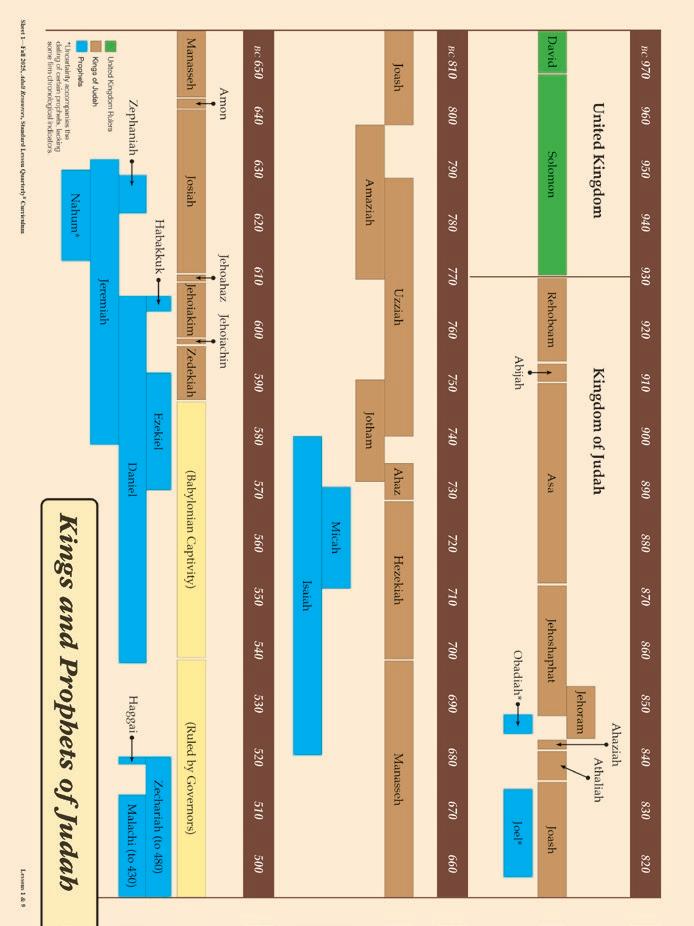

ADULT RESOURCES
Indispensable Resources for YOUR Class!
In this packet:
12 visuals (6 sheets, 18" x 24", printed on both sides)
Sheet 1 Lesson 1, 9 and 13
Sheet 2 Lesson 2 and 12
Sheet 3 Lesson 3 and 11
Sheet 4 Lesson 4 and 10
Sheet 5 Lesson 5 and 8
Sheet 6 Lesson 6 and 7
Digital Presentation Helps
• PowerPoint® and Google Slides™ presentations for each lesson include: -Outline of Scripture Commentary -Discussion Questions
-Learning Activities
• Reproducible Activity Pages (PDF) KJV and NIV
• Digital Files of Lesson Visuals (JPG)
If you purchased the Teacher’s Convenience Kit, it includes this entire Adult Resources packet AND the following:
KJV Kit Contents
• KJV Bible Teacher LARGE PRINT
• KJV Bible Student
• Power for Living®—Quarterly take-home paper (1 set of 13 issues)
• Devotions® Pocket Edition—Quarterly daily Bible readings, meditations, and prayer prompts
NIV® Kit Contents
• NIV® Bible Teacher
• NIV® Bible Student
• Power for Living®—Quarterly take-home paper (1 set of 13 issues)
• Devotions® Pocket Edition—Quarterly daily Bible readings, meditations, and prayer prompts
Where Do I Start?
Adult Resources is designed to help you present content from your preferred SLC teaching text (the annual Standard Lesson Commentary or the quarterly version: KJV Bible Teacher or NIV® Bible Teacher). This teacher content is a starting point for any successful teaching experience— take time to study it thoroughly!
Every teacher and every teaching situation is different. That is where this Adult Resources packet comes in. Consider these types of learning situations:

I teach a large group in the church worship auditorium, with projection equipment available. How do I use these resources for my class?
• Download the PowerPoint® or Google Slides™ presentation for your lesson.
• Use the presentation as is, or customize it for your preferred teaching style.
– If you prefer lecture, remove all slides except the slides containing the lesson outline. That outline will match the content in your teaching text.
– If you prefer discussion, remove all slides except the “What Do You Think?” discussion questions. Use the teaching outline from your teaching text and advance to each question as indicated in that text.
– If you like learning activities, use only those slides from the presentation. Summarize content from your teaching text and reinforce it with these activities.
I teach in a traditional classroom setting with tables and chairs. How do I use these resources for my class?
• Find the visual for the lesson you are teaching and post it in a prominent place in the room. It will catch student interest as they enter class and will help generate discussion as directed in your teaching text.
• Download the reproducible activity page for the lesson you are teaching. Print it and make copies for all of your students. Use it as directed by the Involvement Learning section of your teaching text.
I teach in a small group in an intimate home setting with couches and chairs. How do I use these resources for my class?
• Download the visual for the lesson you are teaching and email it to your group a day or two before you meet. To pique interest in advance, include the discussion text about the visual from your teaching text in your email. You can open your study with the print copy of the visual on display.
• Download the reproducible activity page for the lesson you are teaching. Print it and make a copy for each of your students.
• Use the “What Do You Think?” questions from that text to promote discussion.
Of course, these suggestions are only a few of the possibilities. Review this wealth of resources and use them in the way that best suits your class.
Get more help ONLINE! Each week check out StandardLesson.com and look for the link to the In the World feature. By connecting current events with the upcoming lesson, this feature brings weekly timeliness to every lesson! It will help your students to be in the world but not of it.
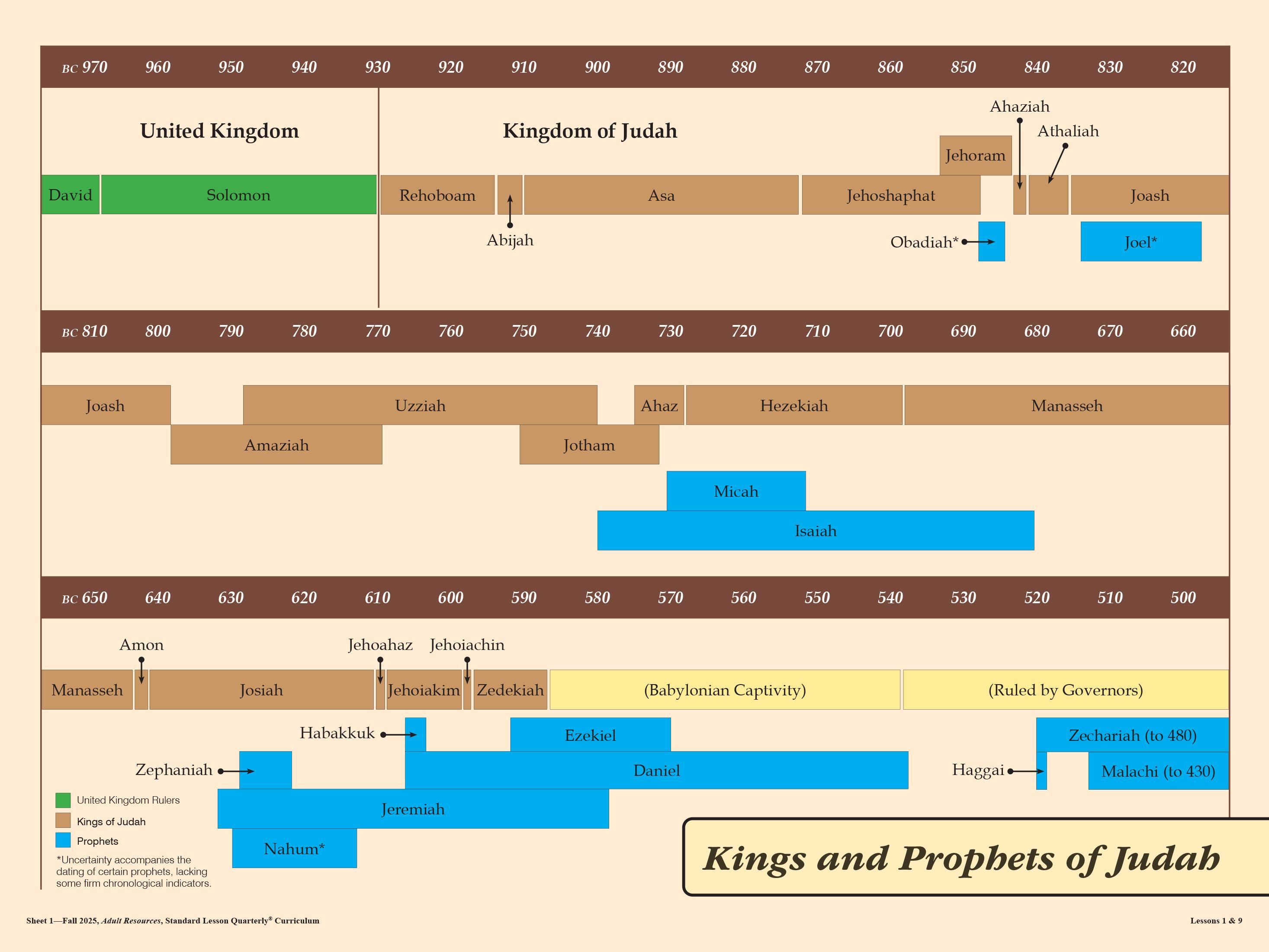

DEVOTIONS
DEVOTIONS®
Daily Devotions for September—November 2025
“In a surge of anger I hid my face from you for a moment, but with everlasting kindness I will have compassion on you,” says the LORD your Redeemer.
Isaiah 54:8
Devotions® is published quarterly by Standard Publishing, an imprint of David C Cook, DavidCCook.org. © 2025 by David C Cook, 4050 Lee Vance Drive, Colorado Springs, CO 80918, U.S.A. Standard Lesson Quarterly® Curriculum and David C Cook and its related logo are registered trademarks of David C Cook. All rights reserved. ISBN 978-0-784-73913-6. Large Print ISBN 978-0-784-77829-6. Printed in South Korea. All Scripture quotations, unless otherwise indicated, are taken from the Holy Bible, New International Version®, NIV® Copyright © 1973, 1978, 1984, 2011 by Biblica, Inc.® Used by permission. All rights reserved worldwide. Scripture quotations marked (KJV) are taken from the King James Version. Lessons and/or Readings are based on the Uniform Series International Sunday School Lessons International Bible Lessons for Christian Teaching Copyright © 2022 National Council of the Churches of Christ in the USA. Used by permission. All rights reserved. Digital products are subject to the End User License Agreement (EULA) found at DavidCCook.org/eula/ and any additional terms or restrictions that may accompany the product. Digital products cannot be returned, sold, or relicensed. This product license is good for 6 months. After 6 months, you must purchase another license.
Editors: Karen Cain, Christine Dallman
Cover Design: Jon Middel
Design & Production: Dale Meyers Vol. 68, No. 4
Judah, from Isaiah to the Exile
The world these days feels like a rollercoaster, and that feeling is magni ed whenever I look at the news. I can’t turn on a screen, pick up a paper, or scroll through a feed without seeing political turmoil, economic unrest, human suffering, violence, and more. The world is a mess for sure—but that’s nothing new. Since the garden, the world has been full of bad news.
But along with the bad news, there is good. There is beauty and healing, birth and rebirth. There is forgiveness, reunion, and love. And this has also been so since the beginning.
This unit of lessons nd us in a period of time much like today—with its ups, downs, and in-betweens. And then, as now, God had a message for His people. It was a message of righteous anger and disappointment, a message of warning to be delivered through God’s prophets. Because the people of Judah had willfully and repeatedly chosen the culture around them over their covenant with God, they would be disciplined, exiled from the land where they and their ancestors had dwelt in the shadow of God’s wings. This consequence was a direct result of their own ungodliness and collective sin. It was heavy and unpopular news—but there it was, direct from the lips of a holy, almighty God.
Yet along with this heavy blow came the hope of a promise. A promise of redemption. A promise of rescue. A promise of restoration. A promise that God had not in fact deserted His people nor turned His back on them for good. A promise that all would be well in the end. And this news also came directly from the lips of a holy, almighty God—the Redeemer, whose kindness is everlasting and whose mercies are new every morning.
Much like God’s people of old, we too are surrounded by a culture of idols, of sel shness, and of sin. Our choices have consequences, and God’s warning still holds true. We must constantly decide where our loyalties lie, where our eyes are xed, where our hearts call home. May we resolve to honor our covenant with the Father, shining His light into the darkness of the world around us while being careful not to succumb to it. Now more than ever, the world needs the hope to which we hold.
Gratefully yours and His, Karen
Approach Each Day with a Heavenly Perspective
Using these devotions, you’ll read the recommended text of the Bible, consider how its message applies to your life, then use the brief prayer to begin a conversation with God.
If you follow the ISSL Series, you’ll likely notice that these devotions align with the ISSL Home Daily Bible Readings. Every day you pick up this devotional, countless people around the world are reading and studying the same verses as you. Opening the Bible each day invites us to a deeper fellowship with Christ as we apply God’s Word to our lives.
A Life of Faithful Service
Then [Isaiah] heard the voice of the Lord saying, “Whom shall I send? And who will go for us?” And I said, “Here am I. Send me!” (Isaiah 6:8)
Scripture: Isaiah 6:1–8; 38:1–5
Song: “My Life Is in Your Hands”
When my grandpa passed away, condolences ooded in to our family. One woman shared about how her son had asked her to name Christians who had been faithful to God throughout their lives. She said my grandpa had been a shining example of faith through his lifelong commitment to Christ.
Chapters 6 and 38 of Isaiah are like bookends to his prophetic ministry, which stretched through the reigns of four kings. King Uzziah was mostly faithful, until pride overtook him. King Jotham served God faithfully but didn’t stop the people’s corrupt practices. King Ahaz was incredibly evil, sacri cing his own children to foreign gods. King Hezekiah puri ed the temple and turned the people’s hearts back to God—but he too suffered the consequences of pride in his later life. Through it all, Isaiah was there, providing the same message: “This is what the Lord says.”
Sometimes I long to have a life of great impact like one of the kings of Judah. But the life of Isaiah and the story about my grandpa remind me that a life of faithful service to God is just as valuable—and perhaps even more dif cult. Let’s let go of any desires for fame, fortune, or power and strive for simple obedience and faithfulness.
Father, help me to be faithfully obedient to You. In Jesus’ name I pray. Amen.
Open Your Palm Wide
You open your hand and satisfy the desires of every living thing. (Psalm 145:16)
Scripture: Psalm 145:13–21
Song: “Great Is Thy Faithfulness”
When our oldest daughter was in college and one of her rare weekends at home was wrapping up, she circled her grandparents’ living room to give goodbye hugs to all. But when she got to her dad, something changed. After their hug, Elizabeth held out her right hand, rubbed her ngers together, and opened her palm wide to ask for cash. Everyone laughed, but the girl received what she knew her dad could give.
Psalm 145 paints a vivid picture of God’s posture toward us. He is not stingy or close- sted. No! His ears are open to our cries (v. 19), and His hands are open wide, ready to satisfy our desires (v. 16). He is trustworthy and able to provide. What are you asking God for today? Perhaps it’s resources, friendship, or future plans. Maybe you need healing for your mind, body, or broken heart. Whether your need is big or small, be bold and expectant. When you open your palm to Him, know His hand is already open to you. He is faithful in providing all you need.
Father, I look to You. Hear my cry as I open my hands to the One who alone can satisfy and fill me with all I need. In Jesus’ name I pray. Amen.
September 8–14. Lenae Bulthuis lives with her husband, Mike, on a Minnesota grain and livestock farm. She enjoys her family, strong coffee, and long conversations about Jesus and His grace.
The Key to a Changed Life
Produce fruit in keeping with repentance. (Matthew 3:8)
Scripture: Matthew 3:4–12
Song: “Change My Heart, O God”
Our youngest daughter, known for her quiet nature, jumped into her 18th year from an airplane. The 13,000-foot skydiving jump was a crazy distance to fall. But the greater leap for those who knew the birthday girl came from how starkly out of character this was for a self-proclaimed homebody.
The premise of today’s reading is one of radical change. John the Baptist preached a message of repentance. Some responded by confessing their sins and turning their lives over to God. But the Jewish religious leaders did not. They dug in the heels of their hearts, refusing to budge from their traditions or turn toward God. So John warned them to change their hearts and “produce fruit in keeping with repentance.”
Repentance is key to a changed life. When we repent by confessing our sins and turning toward God, He changes our hearts, which begins to change everything else. The fruit of repentance is new behaviors and character, proof of a changed heart and life. Using our words to lie, manipulate, or gossip becomes out of character. It’s out of character to be prideful, unforgiving, or sel sh. But what if we still fail and fall, whether in an unintentional stumble or a 13,000-foot nose dive? In either case, His love invites us to return to Him. Jesus forgives us, picks us up, and helps us walk changed and in step with Him again.
Father, thank You for the forgiveness and new life found in Jesus. Change my heart so that my life produces fruit in keeping with repentance. In Jesus’ name I pray. Amen.
Truth for the Tired
“Repent, then, and turn to God, so that your sins may be wiped out, that times of refreshing may come from the Lord.” (Acts 3:19)
Scripture: Acts 3:12–20
Song: “Refresh Me”
As a teenage girl who slept in whenever possible, I never understood my father’s morning routine. As a dairy farmer, he could’ve slept until 5 a.m. before milking the cows, which was early enough! But he chose to get up at 4 a.m. to spend an uninterrupted hour in prayer and Bible study. That time was valuable to my dad because his refreshment came from being with God.
In Acts 3, Peter confronts the crowd with the truth that Jesus, whom they had disowned and handed over to be killed, is alive. They put to death the author of life, but God raised Him from the dead and now invites them (and us) into a new life. The Messiah has come, and He offers refreshment and forgiveness.
Teenage girls are tired, and they’re not the only ones. Exhaustion, burnout, and fatigue are the norm in today’s society. Yet no amount of sleep, vacation days, vitamins, or self-care can give energy to an exhausted soul. The truth for the spiritually tired is that real refreshment comes from a relationship with Jesus. When we repent and turn to God, Jesus wipes out sin, our biggest problem, and then He does what only He can do: He refreshes us from the inside out. In His presence there is hope, peace, shelter, and rest.
Father, I’m tired and weary. Nothing can satisfy but You. Refresh me in Your presence. In Jesus’ name I pray. Amen.
Always Time to Pray
Is anyone among you in trouble? Let them pray. Is anyone happy? Let them sing songs of praise. (James 5:13)
Scripture: James 5:12–18
Song: “Lord, I Need You”
In our small high school, we could rely on our music teacher, Mrs. B., like clockwork. Everyone knew that if you asked her to pray, she would. First, she’d pray with you on the spot. Then, with a simple but predictable gesture, she’d remove her wristwatch and put it back on with the face upside down as her intentional reminder to continue praying for you.
James concludes his letter by imploring the church to pray in faith. Our prayers are powerful and effective. James gives speci c instructions. Are you in trouble? Pray. Are you happy? Sing songs of praise. Are you sick? Call the leaders and pray. His message is clear. We need God at all times and in all places. It is always time to pray.
Though timely, we don’t need a wristwatch to be prompted to pray. Praise opportunities abound—a new day, a new job, or a phone call from an old friend. Prayer prompts for those in trouble are everywhere! An argument, an ambulance siren, or an anxious teen’s outbursts are all prayer alerts. We need God. It’s time to pray. And while we may say it’s always time to pray, the evidence of what we really believe about prayer is seen in how much time we spend in doing so.
Father, I need You. Thank You for the open invitation to pray anytime, anywhere, about anything. Hear my prayers and move for Your glory, I ask. In Jesus’ name I pray. Amen.
Only Jesus
“The blood will be a sign for you on the houses where you are, and when I see the blood, I will pass over you. No destructive plague will touch you when I strike Egypt.” (Exodus 12:13)
Scripture: Exodus 12:3–14
Song: “Not What My Hands Have Done”
The rst time I started reading through the Bible, I was eight years old. I began in Genesis but abruptly stopped in Leviticus. There’s some strange stuff in Leviticus, especially when you’re eight. But the even bigger problem was that I got the Bible ip- opped. Rather than looking for God’s message through Jesus, I made it a book about me. How am I supposed to live? What am I supposed to do?
The Egyptians had enslaved the Israelite community for 400 years. There was nothing God’s people could do to save themselves. They needed a Rescuer. In Exodus 12, God does just that through the Passover. When God saw the lamb’s blood on their houses, He passed over them. He saved their lives and secured their freedom.
The Hebrews couldn’t have known that Passover pointed forward to Jesus, the Lamb of God (John 1:29). Jesus shed His blood for the sins of all people. He died to secure our freedom from death, and He rose so we could live. The storyline of Scripture is Jesus, only Jesus and always Jesus. It’s not about what we must do, but what Jesus did for us. Then, knowing God’s story, we can live a good story—a story that points people to Him.
Father, thank You for forgiveness, freedom, and life in Jesus. Thank You for all He has done for me. In Jesus’ name I pray. Amen.
Worship that Counts
“There, in the presence of the LORD your God, you and your families shall eat and shall rejoice in everything you have put your hand to, because the LORD your God has blessed you.” (Deuteronomy 12:7)
Scripture: Deuteronomy 12:5–12
Song: “House of the Lord”
There were 26 students in my sixth-grade class. I remember because there was a head count every time we got on and off the school bus for a eld trip. Each of us mattered, and we belonged together. No one would be left behind.
Moses was getting the Israelites ready for life in the promised land. In Deuteronomy 12, he describes the system of sacri cial worship for the people of God. God would guide them to the place of worship and specify what they should bring. They were to come with their best offerings, all their people, and hearts full of praise. As a community, they were to worship with joy and gratitude. They were to thank God for who He is and all He provides.
God still invites us to worship in community, not out of ritual but to rejoice in our salvation in Jesus Christ. We don’t gather to count heads but to count His blessings. His people belong together. But are people in our faith communities being left behind? Are we missing the joy of worshiping God together? Gathering with God’s people matters. It draws us closer to God and one another. Who can you invite to Bible study or church today?
Father, I worship You and thank You for Your blessings. Teach me to prioritize worshiping with Your people. In Jesus’ name I pray. Amen.
Prayer List
A regular devotion time is the perfect moment to go to God with requests, concerns, and praises. Use this space to remind yourself of particular needs that you wish to bring before God, and be sure to capture how you experience God’s answers to your prayers.
Name Request/Concern/Praise
Devotions® provides focus and direction for daily reflection. Each devotion includes:
• The Scripture reference for the day’s Bible reading
• A Scripture verse for memorization
• A song suggestion for praise and worship
• An inspiring, thought-provoking meditation
• A prayer thought to focus your heart and mind on communicating with God
Discover more at StandardLesson.com.


Navigating Mental Illness
BY KATHLEEN A. TRISSEL
Lying on a hospital gurney in ICU, I felt like I was drowning in a sea of sorrow and despair. As I waited for a room to become available, time stood still. The longer I waited the more I cried. I wanted to be anywhere except where I was.
God, where are You in all of this? Do You love me less now? Will You stick by me? Have I gone too far?
I had just taken an overdose of pills. I felt so ashamed, so distant from God, that the flow of tears would not stop. I reached for one Kleenex after another until the box was empty, and still more tears came.
As soon as a bed opened up, I would be admitted to the psychiatric ward of the hospital, where I had been many times—but this was the first time I would be admitted from the ICU!
Even though I was a licensed counselor by profession, I was unable to help myself.
I had dealt with mental illness— bi-polar and OCD—since I was a child. As an adult, I worked intermittently as a licensed counselor when I could, and went on disability when I couldn’t, which made me feel even worse. My sense of worth and purpose in life was tied to what I could “do” and “accomplish,” and I thought I had to perform successfully by the world’s standards to have the approval of God.
But ignoring my limitations had taken a heavy toll, resulting in more anxiety and less contact with reality, leaving me unable to function, and landing me in psychiatric units time and time again.

As I was transferred to the psychiatric unit from medical ICU, my tears flowed, and I was unable to say a word.
The hospital aide said, “You’ll be alright.”
I wasn’t so sure.
Finding healing in community
A few months later, I was back home and on disability, isolating myself as usual.
One day I got a phone call from Norma, a woman from the church I had been attending.
“Kathleen, Herb and I host a weekly Bible study at our house. Dave and Elaine are the co-leaders. Why don’t you come? I think you’ll enjoy it. Please come, Kathleen.”
I knew I needed people in
my life—needed to be part of a community beyond casually attending Sunday services—but it was complicated. I suffered from extreme anxiety to the point that sometimes when I was talking to a person, I couldn’t get my breath. My breathing would become labored, like I had just run a marathon.
“Norma, thank you,” I managed to respond. “Now’s not a good time, but maybe some other time. I’ll think about it.”
Of course, I didn’t think about it again.
But Norma kept inviting me. Three times, to be exact. The third time, I realized she wasn’t going to give up.
“Okay, I’ll come,” I relented.
Over the coming weeks, I was surprised to discover that this wasn’t
just a weekly study, but a small group of people who really cared about each other—and about me. I was invited into authentic conversations about what I was going through, invited to people’s homes for dinner, invited into relationships with people who prayed for me throughout the week.
song on a loop all night or day long gave me something to hold on to.
One day as I was talking to God, I felt this prompting: “Let your obsessions become the desperation that lead you to My Word.” After that, whenever I began to feel obsessive about one thing or another, I would
One day as I was talking to God, I felt this prompting: “Let your obsessions become the desperation that lead you to My Word.”
People in this group loved and accepted me and it didn’t matter if I was employed or on disability, or if I was “productive” by the world’s standards or productive by standards that were healthier for me.
Real healing in community began to take place in my life. I began to wonder, what if God’s love for me and approval of me wasn’t based on my performance either? It definitely gave me something to think about.
Embracing calm for my mind
Because I have OCD, I experience a lot of mental torment when my mind gets focused on negative things. For example, after being a clinical counselor for others and then entering my own mental health crisis, I felt like the devil was laughing at me. The almost-physical pressure I felt on my mind was horrible, and I couldn’t shake the tormenting thoughts.
I began to discover things that helped me. Playing the Word of God as I went to sleep or putting a praise
let myself become obsessed with memorizing Scripture. One month I memorized the entire book of Philippians.
Recognizing early signs
I’m also growing more alert to warning signs that point to symptoms of the illness, which helps me take quicker actions—like contacting my doctor—to stop my descent. I’m also learning how to respect my limits. I’m not saying I’ve got it all figured out yet, but I’m taking baby steps in the right direction.
For example, I was excited to volunteer with a ministry that helps women in prison by editing their quarterly newsletter. But when my role doubled to include writing letters and other ministry content, I felt overwhelmed and began experiencing that dreaded physical pressure on my mind again.
In the past I would have pushed past the warning signs and found myself in full-blown mental health
crisis. But this time I was sensitive to what I felt was a prompting from God. He was saying, “I know you took this on to please Me—if I ask you to, are you also willing to release it?”
When I compare myself with others and measure my success by theirs, I am discounting the person God created me to be. But when I allow Him to be the source of my acceptance and approval, it removes the pressure to compare myself with the performance of others. What a relief!
Thanking God for hidden blessings
There is a hidden blessing in facing my limitations, and even in my longterm struggle with mental health. Facing my weakness and mental fragility requires that I humble myself, but it also means I can receive God’s strength. Scripture tells us that we can receive in strength in our weaknesses (2 Cor. 12:10). I am growing in the ability to rejoice and be glad in my weakness, as it makes me more dependent on the Lord (2 Cor. 11:30).
There’s also an intimacy with Christ that has come out of everything I’ve experienced.
In 2020 I had a dream that I really felt was from the Lord. In my dream, I was caught up in a riptide in the ocean, but I wasn’t panicked. Pulled under the swirling water, I caught an air pocket so I could breathe. Then my dream changed, and my house was on fire, but I had my two cats with me, and they were safe.
I was working as a clinical counselor at the time, and I believe
“I know you took this on to please Me—if I ask you to, are you also willing to release it?”
the Lord was warning me that while I would be coming into a difficult time, I would be okay
A few months later, I found myself struggling as mental illness got the upper hand again. I had to go back on disability. But this time I wasn’t suicidal. This time I wasn’t panicked. This time I told myself, I’ve been here before, I know what to do.
I still struggle with the obsessions and compulsions of my mind, and sometimes with paranoia. But I rejoice when I hear Steven Curtis Chapman sing about Jesus being our Magnificent Obsession. I pray always that Jesus will always be my magnificent obsession.
Sometimes in my life I have counseled others, and sometimes I’ve been the one in need of counseling. But nothing will ever hold a candle to the work of our “Wonderful Counselor” who will never leave us or forsake us (see Isa. 9:6 and Heb. 13:5).
Laying on the gurney in ICU in a sea of despair, I cried out, God, where are You in all of this? Do You love me less now? Will You stick by me? Have I gone too far?
Those questions have long been answered in the ongoing display of His compassion, presence, and healing. P f L
DEVOTIONAL
by
Jeremy D Vance

Treasure in Jars of Clay
POWER for LIVING® is published quarterly by Scripture Press®, an imprint of David C Cook, DavidCCook.org. © 2025 by David C Cook, 4050 Lee Vance Drive, Colorado Springs, CO 80918, U.S.A. Scripture Press® and David C Cook and the related logos are registered trademarks of David C Cook. All rights reserved. ISBN 978-0-781-44642-6 Printed in South Korea. All Scripture quotations, unless otherwise indicated, are taken from the Holy Bible, New International Version®, NIV® Copyright © 1973, 1978, 1984, 2011 by Biblica, Inc.® Used by permission. All rights reserved worldwide.
Editor: Karen Scalf Bouchard Designer: Susan Murdock Production: Sean McCoy Vol. 86, No. 1
As a person who has struggled with depression, I know that I can focus on my struggles and feel isolated and abandoned in my weakness.
Then I remember the words of the apostle Paul: “But we have this treasure in jars of clay to show that this all-surpassing power is from God and not from us” (2 Cor. 4:7).
Like jars of clay, our bodies are fragile. Anxiety or depression can cripple us. Physical health can fail us.
Yet within our frail bodies, we carry the treasure of life in Christ and the light of the gospel which displays the glory of Christ (2 Cor. 4:4). In fact, our frail bodies reveal and showcase that life and light and glory because these things are clearly not of our own doing!
It can be easy to dwell on the weakness of our bodies and become discouraged, but we must remember that God still calls to us! He draws us closer to Him. He can use our weakness to showcase His power and glory. Depression or anxiety can’t limit what God
can do. We might not experience complete healing this side of heaven, but we can celebrate the life and light and glory we carry even in our brokenness.
Our enemy wants us to struggle with hopelessness over our frail bodies and even become angry with God, driving a wedge between us and the Lord. This can lead us into despair. We battle against this tactic when we thank God that He loves us deeply, understand that our weakness doesn’t limit Him, and say “yes” to all that He longs to accomplish in us and in the world.
Great men and women of God have suffered mentally and physically—but that didn’t hinder God from calling them into a deeper understanding of Him and into the blessing of impacting others for Him.
While understanding this truth might not relieve our struggles, it can begin to change our focus from our weakness to our God. Instead of looking within, let’s look up to our faithful Lord who gives us the treasure of knowing Him in our jars of clay.
DAILY BIBLE READINGS
SUNDAY
MONDAY
TUESDAY
WEDNESDAY
THURSDAY
FRIDAY
SATURDAY
Genesis 1—2
Genesis 3—5
Genesis 6—8
Genesis 9—11
Genesis 12—14
Genesis 15—17
Genesis 18—21
New Devotional from Darlene Zschech
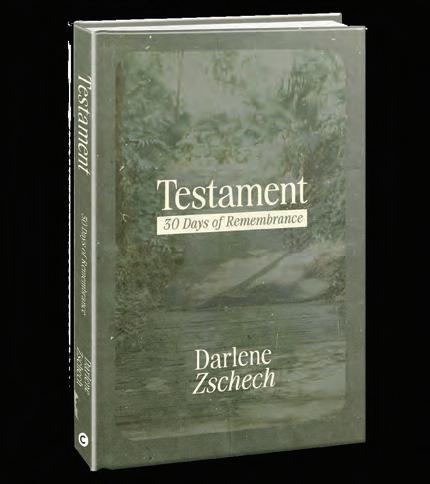
Internationally acclaimed songwriter and worship leader Darlene Zschech provides an immersive journey into worship and reflection, pairing a daily message with a song from her career, such as “Shout to the Lord.” This unique devotional experience provides:
•Thirty devotions that expand on themes in Darlene’s songs
•Biblical insights into why God calls us to worship
•Daily spiritual nourishment and application through stories and reflections
•QR codes that lead to a multi-sensory devotional time


With her years of experience and passion for worship, Darlene brings a rich perspective to every devotion in Testament as she connects the messages of her songs with the truths of Scripture.
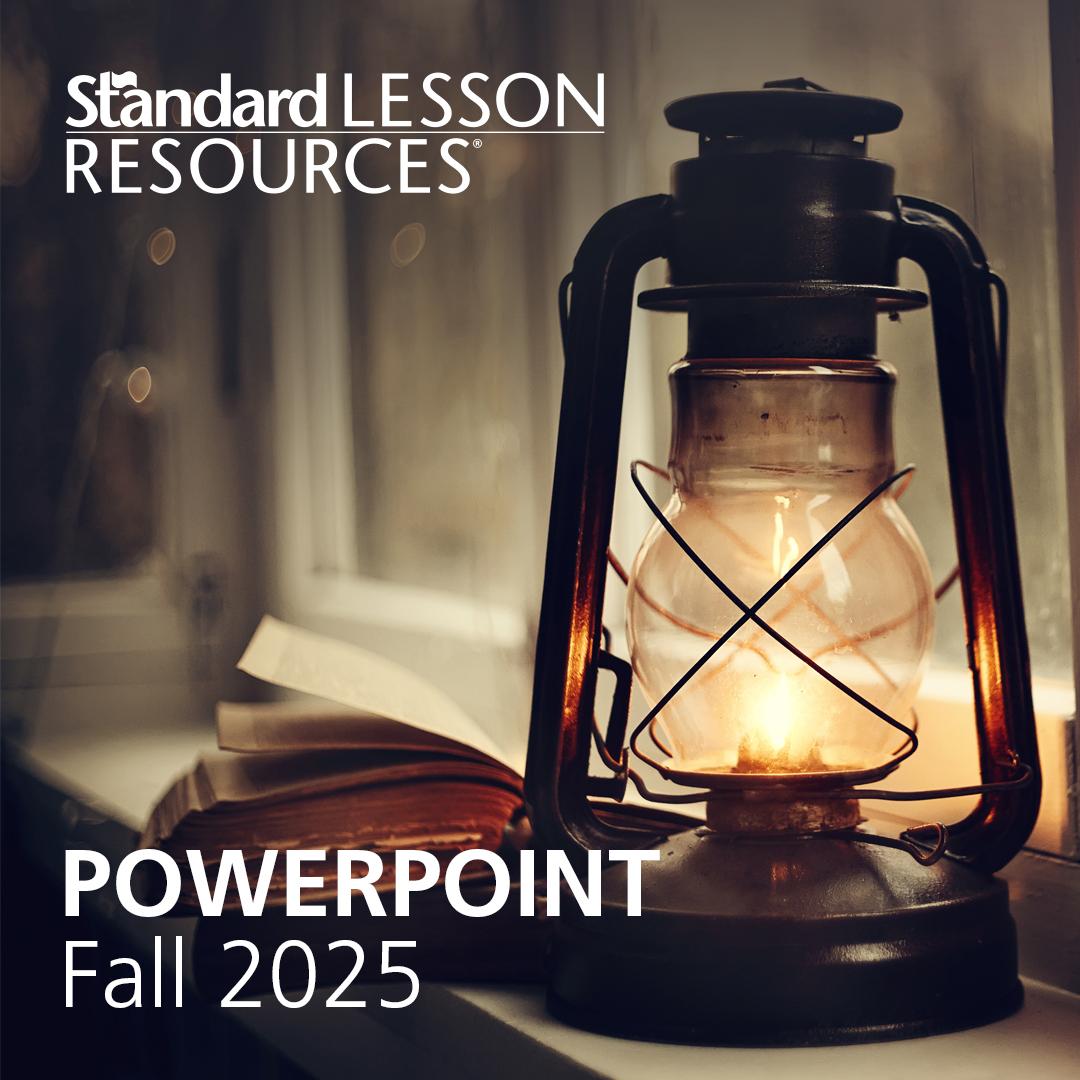
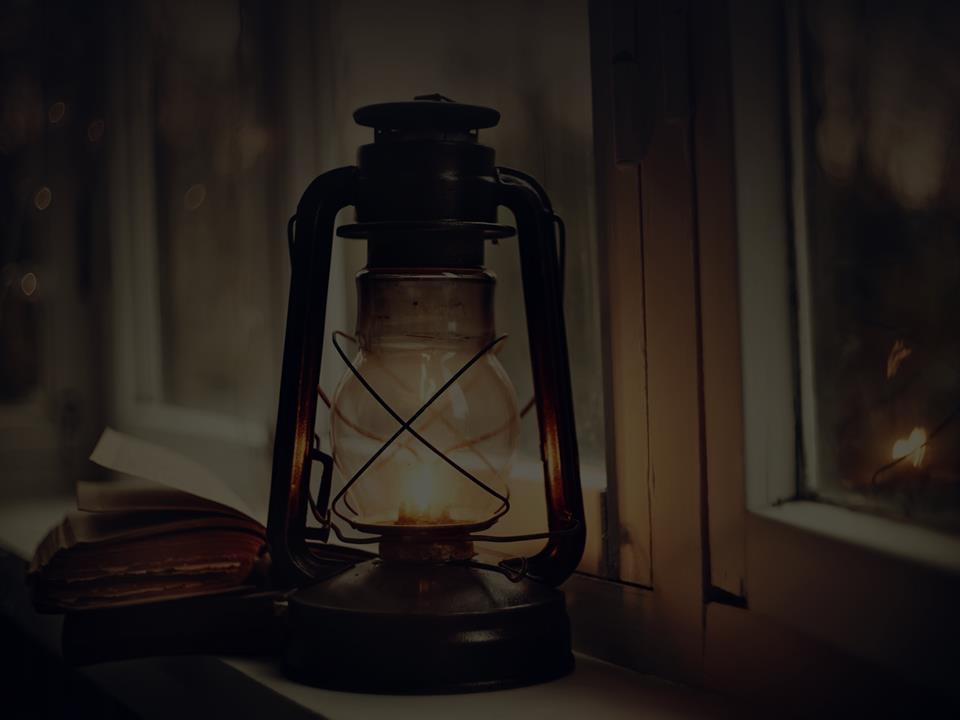
Isaiah’s Call and Ministry
It’s Your Call (and His)
There seem to be two types of calls from God. The first type is what we might designate as a “general” call. These are the thoughts, actions, and attitudes that God expects of every believer.

The second type is what we might designate as a “specific” call: a sensed call of God to a particular or specialized ministry.
Today’s lesson examines the details of a call unmistakably from God.
Into the Lesson

1. You are lost in a dark cave without a companion, weapon, or light. You hear a rumbling noise deep in the cave. The sound grows louder and seems to approach you. What would you do next?
2. You open your mailbox and discover an envelope containing a cashier’s check written for $10,000. The check is made out to you, but there is no personal information regarding the source of the check. What would you do next?
Lesson Context
Isaiah began his prophetic ministry about 200 years after the nation of Israel divided.

Isaiah’s ministry focused on the southern kingdom of Judah, as reflected by the Judean kings listed in Isaiah 1:1.
The people of Judah had become a “sinful nation,” being openly rebellious against the Lord (Isaiah 1:1–5). Such was the era that Isaiah found himself in when his call came about.
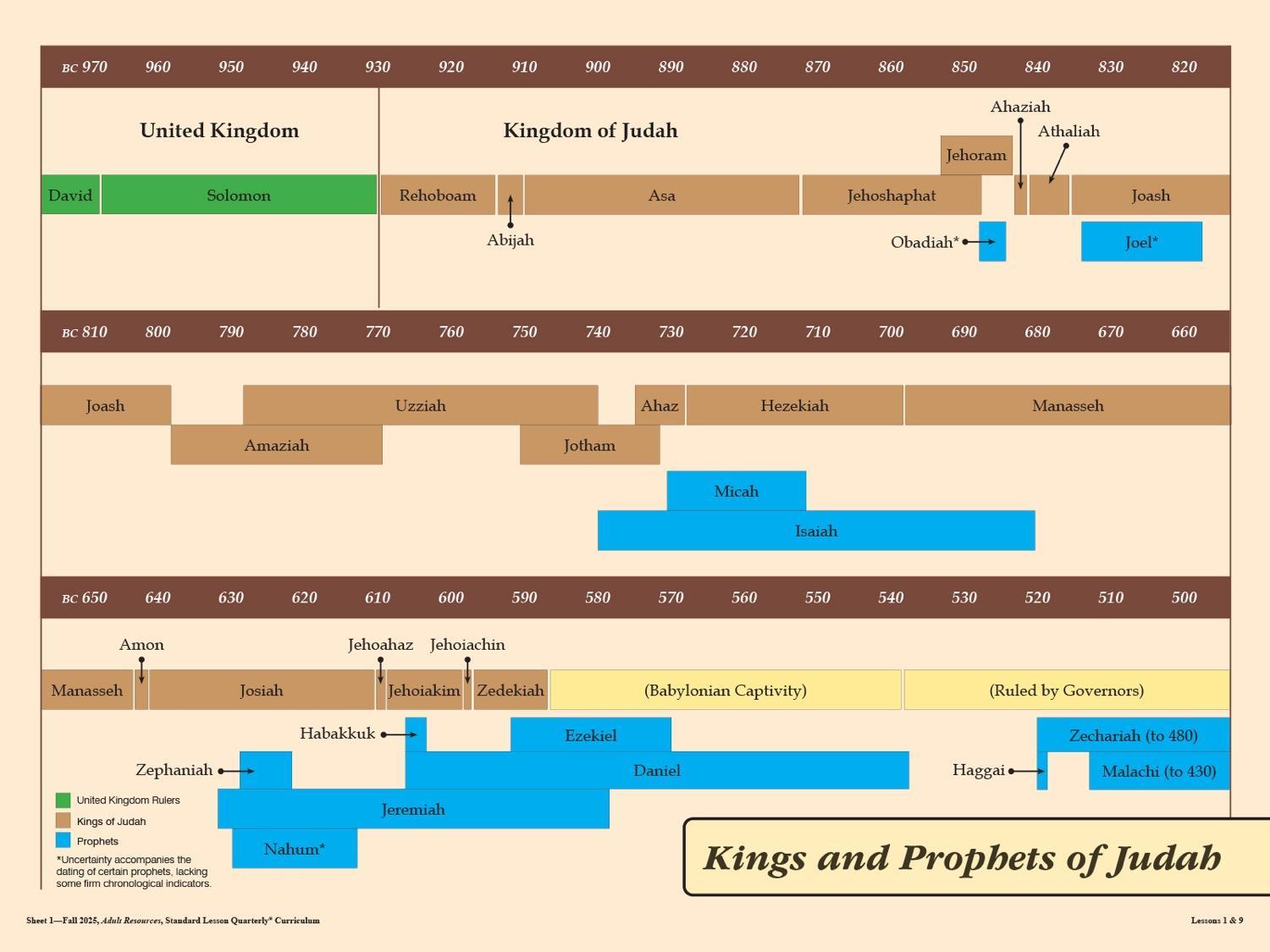
I. Commissioned by God (Isaiah 6:1
–8)

A. What Isaiah Saw (vv. 1–2)
B. What Isaiah Heard (v. 3)
C. What Isaiah Sensed (v. 4)
D. What Isaiah Said (v. 5)
E. What Isaiah Received (vv. 6–8)

What Do You Think?
What does the covering of the seraphims reveal to us about postures of worship and prayer?
Digging Deeper
How do physical, mental, and emotional postures affect your acts of worship?

What Do You Think?
How do you describe the relationship between God’s holiness and the holiness of His people (1 Peter 1:15–16)?
Digging Deeper
How can you help others worship God for His holiness?

What Do You Think?
In what ways can our corporate worship include times of confession?
Digging Deeper
What biblical examples of corporate confession can you name?

What Do You Think?
What prevents believers from saying, “Here am I. Send me!” to God?
Digging Deeper
What steps can believers take to remove these barriers?
II. Communication with a King (Isaiah 38:1–5)
A. Message of Death (v. 1)

B. Tears of Bitterness (vv. 2–3)
C. Extension of Life (vv. 4–5)

What Do You Think?
How would you support someone who has received news of a terminal diagnosis?
Digging Deeper
In such a case, how do you discern whether or not to show your support by speaking up or remaining silent?
Here Am I. Send Me!

God calls everyone to serve Him. Regardless of where God calls us to serve, we should answer with our version of “Here am I; send me!”
Some of us may serve God through vocational ministry. Others will serve Him via their witness through their “9-to-5” jobs, relationships with family and friends, financial support of mission work, etc.
When we follow God’s call, regardless of where it takes us, we are in a place of service to Him.

Thought to Remember
Respond to God’s call!
Into Life

Think of a time when you believed you had received a message or call from God. How did you know it was from God? How did you respond?
“Here am I; send me!”

